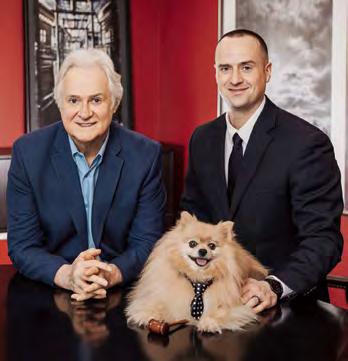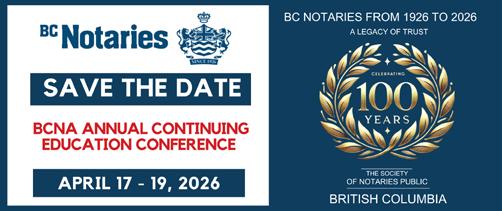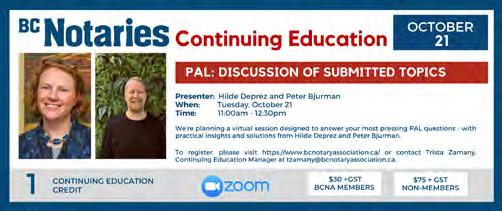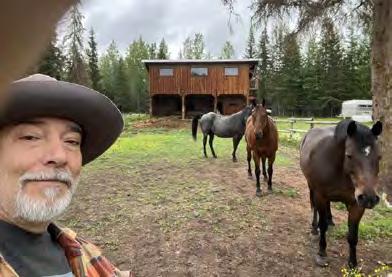

PersonalPlanning Checklist



OCTOBER 20 TO 26, 2025 ARE YOUR DOCUMENTS CURRENT? CONTACT YOUR LOCAL BC NOTARY!




• Probate Applications
• Legal Advice to Executors
• Testamentary Trusts
• Living (inter vivos) Trusts
• Incorporations
• Tax-planned Corporate Reorganizations


PersonalPlanning Checklist
Make-A-Will Week
Î Make-A-Will Week is always a collaborative opportunity for the Government of British Columbia and the BC Notaries Association to promote awareness of the importance of having a Will in place—or to review the one you already have.
In calendar year 2024, BC Notaries provided Will preparation or review service to 19,989 British Columbians! While making your Will is one of those tasks that’s easy to put off, it’s an important one. It provides an excellent opportunity to consider other Personal Planning documents at the same time, such as Health Care Directives, Representation Agreements, and Powers of Attorney. They will ensure that your wishes for your care, for your family and pets, and for your finances are documented before those papers are needed. I hope this edition of The Scrivener motivates you to book an appointment with a BC Notary in your community and gets you started on the path to peace of mind.
Following a fantastic Summer, the BCNA is hitting the ground running with our Board and MLA Appreciation events planned for October in Victoria. We are also preparing for our virtual Annual General Meeting, taking place November 8. It will include a presentation from the Chair of the Legal Professions BC Transition Board, Mr. Bruce LeRose. Our members will be brought up-to-speed on regulatory transition and have the opportunity to ask questions. We extend our appreciation to Mr. LeRose for his willingness to part icipate.
We are also looking forward to the annual virtual Career Fair, scheduled for February 21, 2026, where Notaries and students in the Master of Arts in Applied Legal Studies Program (MA ALS) at Simon Fraser University can make introductions and consider post-commissioning career opportunities.
And of course, planning is already underway for the Continuing Education Conference taking place at the Fairmont Hotel Vancouver, April 17 to 19, 2026, where the BCNA will help celebrate the 100th anniversary of The Society of Notaries Public of BC.
With that look ahead to events on the horizon, I’m reminded of the old saying, “Time Flies.” To me, that expression has never felt more accurate! Do please make time to plan for your future with the assistance of a BC Notary and don’t forget to enjoy those things that are most important to you.
Respectfully,
Chad Rintoul, Chief Executive Officer

With that look ahead to events on the horizon, I’m reminded of the old saying, “Time Flies.” To me, that expression has never felt more accurate! Do please make time to plan for your future with the assistance of a BC Notary and don’t forget to enjoy those things that are most important to you.
CHAD RINTOUL
Duty, Honour, and Traditions
Navigating Wills in South Asian Communities in BC
Î The very first Will instructions I completed as a BC Notary Public was for an elderly Punjabi man I called “Uncle Ji.” In the South Asian community, that is the way you show respect to your male elders, regardless of whether that person is your actual uncle.
The man’s daughter had called to advise he was in hospital on his deathbed and needed a Will. Greeted by all his children, I entered Uncle Ji’s hospital room, completely sterile-gowned and masked to take his Will instructions. Our in-depth conversation about his family included how hard he and his late wife had worked, information about his married kids and grandchildren, and how well all his kids had taken care of him since he had fallen ill—especially his daughter.
He said he was very blessed.
When it came time to discuss the distribution of his estate, he chose to leave everything equally to his two sons and nothing to his daughter. He told me he had paid for his daughter’s wedding and given her $50,000 in the past.
His sons were going to get a lot more money than that. He said it was the responsibility of his sons to take care of their sister and support her if she ever needed it.
Several thoughts and emotions arose in me . . .
y Hadn’t he paid for both his sons’ weddings?
y Hadn’t he supported his sons financially over the years?
y Was a dowry involved in his daughter’s wedding?
y Was he now being fair to his daughter?
Uncle Ji believed he had done his duty and provided enough for his daughter . . . she has her own separate family and, when needed, there is the promise that her brothers would be there to help her.
As a South Asian woman, I understood the customary rationale behind his decision but I felt the imbalance to his daughter in his Will instructions. After I advised him of his legal obligations under WESA, the Wills Variation Act in BC, he acknowledged my advice but was firm in his decision—saying his kids were aware of his wishes.
As I concluded our meeting, I didn’t know whether I would proceed further. Outside his room, I spoke briefly with the adult children. The daughter said she had already spoken to her father about his wishes and was fully aware of his decision to leave everything to her brothers. She was also aware she had a legal right to a share of her father’s estate. She didn’t want it—she loved her father and wanted to respect and honour his wishes. Her brothers felt the same . . . and that was the way it was going to be.
I drafted the Will as per Uncle Ji’s wishes and returned to the hospital to have him sign the document. A few days later, he passed away.
I grew up hearing about family lineage, the importance of the family name and honour, and that the family inheritance passes to sons. I heard it through family members and friends and saw it in the movies. Therefore, I viewed it as normal; it was our culture and I accepted it. Only when I reached my early 20s did I really begin to question that trad ition.

Present Day
Over the past 14 years in my Notary practice, I have learned that cultures and traditions vary in many communities. Such traditions are not exclusive to South Asian culture. I believe it is imperative for legal professionals to understand the cultural norms in their communities, to better serve and advise residents in their unique estateplanning matters. For BC Notaries, navigating that terrain requires both cultural empathy and the vigorous application of noncontentious law, to balance respect for heritage and modern legal responsibilities.
To build trust in BC’s diverse communities, we must approach clients with sensitivity. Conversations should encourage more open dialogue and not be based on assumptions. Legal professionals are conduits between cultural practices and the law. The more education we offer to community members about their legal obligations to spouses and children, the better they will understand the current law.
Like many other communities, South Asian communities are still deeply rooted in traditions; their family lineage passes through the male line and the sons are seen as the carriers of the family name. Patriarchal inheritance is born of longstanding social norms and concerns about preserving property and business. Although that mindset is slowly moving away from traditional practices, legal professionals need to consider the growing new-immigrant population who may still hold onto old cultural values.
RIMPY SADHRA
Women often bear the burden of navigating family pressure. Many choose not to challenge unfair Wills due to the fear of family conflict, shame, or the compromise of family honour. The desire or fear around upholding traditions weighs heavily on many families and can lead to the generational breakdown of relationships.
Some families still don’t wish to discuss those matters. For example, the elder generations may shield younger family members from such discussions to preserve hope or control or to avoid discomfort about the fear of death.
Other families may be silent when it comes to finances and inheritance. The topic of money may not be discussed openly or it is limited to conversations
with the males in the family. Advance health care may also not be discussed. Those protocols make it challenging when it comes to necessary estate planning.
Often, the elder generation may not contribute their thoughts on other taboo-topics such as funerals or Wills or Powers of Attorney. To speak of such matters may not be appropriate. Until recently, conversations about death or inheritance were often shrouded in silence, viewed as too private, unseemly, or even harmful to family ha rmony.
Dear colleagues and readers, I am grateful for the opportunity to share some thoughts on cultural awareness and the inheritance traditions that shape estate-planning practices in many
The desire or fear around upholding traditions weighs heavily on many families and can lead to the generational breakdown of relationships.
communities. It is important to explore how we can respectfully apply the legal framework in British Columbia together . . . for effective Personal Pla nning.
Regards, Rimpy Sadhra, West Coast Notaries
KEYNOTE
EDITOR-IN-CHIEF
Every Week Is Make-A-Will Week
Î BC’s Make-A-Will Week is supported by the articles in the theme section of our Fall magazine.
Every week is really Make-A-Will Week! Your local BC Notary will be delighted to assist you to create the legal documents you need for your Personal Planning por tfolio.
What are the benefits of having those legal documents i n place?
They include your peace of mind and the future facilitation for those who will be involved in managing your estate matters when the legal documents are needed. Those individuals may include health care professionals.
Estate is an umbrella word that covers your financial holdings or interests, minor children, pets, property, possessions, and so on.

VAL WILSON
Some people have a lot; some have a little.
For each of us, a Will is necessary to express our wishes . . . so they will be carried out at a later time. For those without a valid Will, the Office of the Public Guardian and Trustee in BC will take over the distribution of our assets and charge our estate for their work. Although that fact is mentioned in two articles in this issue, it is so important that I have noted it here. Not having a legal Will when we pass is called being intestate. That’s not a good thing!
This can be your Make-A-Will week!
Empower Yourself Through Personal Planning!

Î Does the idea of making a Will, Power of Attorney, or Representation Agreement send you into overwhelm freeze mode or flight mode—even an escape to the dreaded Honey-Do list? Anything but deal with Personal Planning documents?
You’re not alone.
Kim Findlay, Divisional Director of Development for The Salvation Army, recently stated in BC Business Leadership issue #53 that “only about 48 per cent of the BC population has a Will.” Yet, ironically, we are living in a time where it is said this generation will face the largest-ever transfer of wealth.
Having worked in the Personal Planning area of BC law for over 49 years, I can say it’s true that estate planning can be daunting but it’s also empowering. I recall an elderly couple that arrived at my office years ago— uncertain where to begin.
shutterstock.com/
In our consultation, I learned they had an estranged adult son; years earlier they had given him a large cash gift, essentially an inter vivos gift, an advance from the parents’ estate to help their son purchase a home. Over time, however, the relationship soured. Despite the parents’ many attempts to reconcile with their son over numerous years, they remained estranged. With that painful disappointment, the parents struggled at the idea of getting their Wills done. When the husband learned his son would have a right to his parents’ estate under an intestacy (no Will), they were motivated to do their doc uments!
They came to see me. Their Wills were done, equalizing equivalent gifts to their other children to the one their estranged son had received. Several years after the last parent died, the son did contest the Wills. Happily, in addition to having proper Wills in place, we had also made—in support of the

When the husband learned his son would have a right to his parents’ estate under an intestacy (no Will), they were motivated to do their documents!
TAMMY MORIN NAKASHIMA
distribution stated in the Wills—appropriate documents clarifying the reason for each of the gifts.
The matter was settled with minimal effort and cost, with no redistribution given to the estranged son. Having taken the initiative to come in and meet with me, and do the work to plan, the couple was empowered to leave a legacy that reflected the balance and fairness they i ntended.
Meeting with your BC Notary can potentially save your family tens of thousands of dollars, as well as the anguish of making a costly mistake.
As it turned out, their child ended up in a nasty divorce and the value of the property had increased by over $500,000. Having professional advice kept their property from being tied up in an acrimonious divorce. When the parents sold the property during that time, they saved an approximate $100,000 in capital gains tax that would have been payable if the child had been on title.
The many, many clients with whom I have worked over the years express their satisfaction once their estate planning documents are done and off their New Year’s Resolution list. Today after I completed a Will file, the clients shared that facing the task had been paralyzing—and how good they felt working with me to accomplish their goal!
When you meet with your BC Notary to get advice and to get your estate planning documents in place, you will have the relief of
y knowing guardians are in place for minor ch ildren;
y eliminating panic of implementing a temporary Will or Power of Attorney before an unexpected trip or a medical emergency; and
Seeking a Career as a British Columbia Notary Public?

There are business opportunities for Notaries in various communities throughout British Columbia. Some of the Requisites for Becoming a BC Notary
• Undergrad degree with a CGPA not less than 3.0
• Interest in the practice of law
• Strong entrepreneurial spirit
• Strong communication and people skills
• Dedication to community and serving the public
• High degree of honesty and integrity
Meeting with your BC Notary can potentially save your family tens of thousands of dollars, as well as the anguish of making a costly mistake. I recall one particular family who had “armchair advice” from friends about adding a child to title to avoid a probate fee and “simplify” the estate. That couple came in to see me years later, saying they were grateful they had consulted me and followed my advice not to add their child to title but rather to organize the distribution of their estate through their Wills.
y creating a Representation Agreement document that enables the family to intervene and advocate for your health care if you need help!
Contact your BC Notary today so you can enjoy the empowerment of being organized and having your wishes in correct legal order.
NOTARY
For more information, please contact The Society of Notaries Public of BC 1-800-663-0343 or visit our website, www.snpbc.ca.
TAMMY MORIN NAKASHIMA, REIBC, is
President
a former
of The Society of Notaries Public of BC who has practised in Richmond for over 29 years.
BC NOTARIES ARE RESPECTED IN THEIR COMMUNITIES.
Building Genuine Connection is the Foundation for Creating a Will
Î When I was commissioned as a BC Notary in 2023, I expected Personal Planning clients to come in with a plan, know who their executor would be, and how they wanted their estate distributed. My role, I thought, would be translating those plans into the appropriate legal documents with some discussion about the implications of the plans.
Naïve, I know . . . and I couldn’t have been more wrong.
Most clients don’t come in with a plan. Sometimes they come in with a pile of notes, apologizing, saying they didn’t know what to bring so they brought it all. Other times, they come in with nothing. Almost every time, I hear “it’s just a simple Will” and then we dig into their uniquely complex situation.
In truth, there is no such thing as a simple Will. Each client has their own family dynamics, concerns, and emotions. Even the few that come in with what seems to be a straightforward situation often come across complications once we start to discuss the implications of their decisions. Every client’s situation is unique, but they all share the same goal—to leave with peace of mind.
I’ve quickly learned that my most important tool isn’t necessarily legal knowledge. Of course that’s essential . . . the most important tool is intentionally trying to develop a genuine connection with each client. I start every meeting the same way, by trying to put them at ease immediately, often with small
talk—except it isn’t just small talk . . . it’s building connection.
When clients feel heard and a genuine connection, they open up. They share all the details that matter . . . like the difficult relationships, the special circumstances, their concerns, and their fears. That is when the real planning happens.
The change I can see in clients . . . from when they first walk in the door to an hour or so later when they leave . . . still surprises me.
They come in feeling stressed and overwhelmed, unsure of what to expect, and nervous that they won’t know the right answers. But, as we chat through our meeting, their anxiety starts to relax and they realize this is just a conversation. It’s guided and intentional, but it is still just a conversation where we work through the questions together.
By the end of our meeting, I often hear, “that was easier than I expected,” or “I feel like I’ve known you for years!” They leave feeling they’ve accomplished something, they are in control, and a weight has been lifted.
What I’ve learned so far is that Personal Planning isn’t just drafting documents; it’s about people and their unique situations. As BC Notaries, we don’t just draft pre-determined plans into legal documents, we are active participants in the planning process and we take on the complexity, so our clients don’t have to work through it on their own.

Most clients don’t come in with a plan. Sometimes they come in with a pile of notes, apologizing, saying they didn’t know what to bring so they brought it all. Other times, they come in with nothing.
MEGAN CHONG
Our technical skills matter but the human skills of listening, organizing thoughts, and providing reassurance and guidance are what really supports the overwhelming legal process and turns it into something manageable and empowering.

THE BENEFITS OF LEGACY GIVING
Help your clients create a lasting legacy while securing tax benefits for themselves and their heirs. Support BC Women’s Health Foundation to drive transformational advancements in health for women, newborns, and families.
For more information, contact Lisa Shearer Director, Legacy + Annual Giving lisa.shearer@bcwomensfoundation.org 604-970-4373

We use our knowledge and expe rience to guide them through their jumbled thoughts to creating purposeful documents that serve their needs. I’ve learned to slow down, make genuine connections, and give clients the space to think out loud and open up.
Our technical skills matter but the human skills of listening, organizing thoughts, and providing reassurance and guidance are what really support the overwhelming legal process and turn it into something manageable and empowering.


MEGAN CHONG is a Notary Public practising with “Notaries on Douglas” in Victoria.



Lynn + Duncan
BC Women’s Health Foundation Legacy Donors
The Essential Matter of the Executor
Î One of the most important decisions our clients make when giving instructions for the drawing of a Will is deciding who their executor will be—the person responsible for executing (wordplay on purpose) their testamentary wishes when the time comes.
From my professional point of view, making sure the Will-maker understands the extent of the executor’s future tasks greatly influences the pool of potential executor cand idates.
Note: The chosen person must agree to be named in the Will as executor.
Most people have a reasonable idea of the person or persons they would like to be executor of their Will—from among "the usual suspects” . . . a friend, a couple, the spouse, a mature person, their adult offspring, and so on. In other words, a known and trusted person. Is just being known and trusted the only criteria that should be considered in the decision? Not necessarily.
Many times, clients have already decided that a certain adult child is the best candidate for the role. Then we start to discuss the baseline traits of a suitable executor.
y Are they honest? Yes.
y Are they responsible? Yes.
y Are they trusted? Yes.
y Are they a good businessperson? Yes.
y Do they live in BC? No . . . Oh.
y Do they at least live in Canada? Definitely not. Uh oh!
While the adult child in our example is a great overall choice, the fact that they don’t live in Canada will
cause huge logistical problems and potential tax issues for the estate . . . they should not be appointed. Since the person the Will-maker identified as the preferred executor is not suitable, our theoretical conversation must turn to the next ca ndidate.

Most people have a reasonable idea of the person or persons they would like to be executor of their Will—from among "the usual suspects” . . .
Duties of the Executor
Acting as executor definitely requires work, they must
y secure the deceased’s real estate and personal property;
y file tax returns;
y deal wit h banks;
y deal with beneficiaries;
y deal with Notaries, Lawyers, and Accou ntants;
y deal with myriad other duties.
The executor does not require knowledge or licensing in any of those specific areas.
One of the most important characteristics of an executor, however, is that they are a practical person who knows their limits. A good executor knows that if they are not capable of managing or completing a given task in a specific realm, they are permitted to seek—and should seek, the advice and services of someone who is capable; the cost will be borne by the estate. That expert assistance will help ensure that the wishes of the Will-maker are carried out as efficiently and as closely as possible.
In summary, although no stated official criteria must be met before someone can be appointed executor, there is a pretty obvious set of guidelines that all Will-makers need to consider when they are making the decision about their executor.
My mantra when it comes to estateplanning generally is that while the legal documents involved and their accurate construction are critical, so is the selection of the right person to act on your behalf as executor.
y A poor choice of executor can turn a simple estate into a complicated situation.
y A great choice can allow a complicated estate to be probated with far fewer complications than it might have had.
CAM SHERK is a BC Notary Public with Sherk & Gandolfo Notaries Public Inc. with offices in Squamish and West Vancouver.
CAM SHERK
Real estate law is complex.
We help you close with confidence. Our comprehensive title insurance coverage is designed to protect your clients, reputation, and transactions, backed by decades of experience and local expertise.
Faster policy delivery. Total confidence.
Our commitment to investing in cutting edge technology, such as advanced ID verification tools, allows us to deliver policies faster than ever.
We're more than a policy. We're your ally in real estate transactions, empowering you to work smarter, close faster, and protect your clients with confidence.


Helping a 106-Year-Old Client Put Her Wishes in Writing
Î At Grant Sauer Notary, we take pride in helping clients feel confident that their wishes are documented clearly and handled with care.
Our approach is always thoughtful; we meet with clients to discuss their goals and information, prepare a draft for review, and give them time to reflect and request any changes. Once they are fully comfortable with the documents, we schedule a signing appointment. For clients who need things done more urgently, we also do our best to accommodate their ti melines.
Says Lianne, “One case that has stayed with me involves an extraordinary client who came to us at the age of 105. A close friend first reached out on her behalf, explaining that ‘Mae’ needed a Power of Attorney (PoA). We emailed our information sheet to her friend who gathered the necessary details and returned them to me so Grant could prepare the draft. Our client reviewed the draft and confirmed she wanted to proceed.”
“When Mae visited our office the following week, she arrived in a wheelchair. What struck me immediately was her sharp mind, strength of character, and determination not to be taken advantage of. Sadly, a grandchild had been too liberal with her grandma’s bank account and Mae wanted a trusted friend to handle her affairs going forward. She reviewed the PoA together with Grant, signed with confidence, and left with peace of mind. At that time, Mae wasn’t ready to update her Will, but it was discussed briefly for the future.”
Several months later, Mae’s friend contacted our office again; this time, our client was ready to update her Will.


We prepared the draft and sent it to her friend to review with Mae. A week later, we had the privilege of visiting Mae’s home. She was now 106 and resting in her sunroom, lit by the bright Winter morning sun. When Lianne and I entered, Mae greeted us warmly and began to sit up. I started reading her Will aloud, but she stopped me. “I prefer to read it myself.” I held the pages while Mae carefully read each word out loud. After every paragraph, she looked up and said, “This is exactly what I want, tha nk you!”
Mae’s strength and clarity continued to inspire Lianne and me. Once we all signed the Will, Mae expressed heartfelt gratitude, relieved that her wishes were finally documented. She knew her estate would be handled exactly as she intended. Not long after, we received a beautiful thank you card expressing Mae’s appreciation for our compassion, efficiency, and willingness to go to her home.
Working with clients like Mae is a privilege and a reminder of why I do what I do. In our office, I have always emphasized the importance of listening to our clients, respecting their timelines, and making sure their wishes are honoured. It isn’t always easy to rearrange schedules but ensuring that people’s affairs are properly managed is at the heart of our work.
“We take great pride in serving the community and helping clients achieve peace of mind—whether they are 25 or 105. That’s who Grant is and I am proud to work with him,” adds L ianne.
BC NOTARY Grant Sauer practises in Langley.
LIANNE MCGARRITY is Operations Manager at Grant Sauer Notary.
GRANT SAUER
LIANNE MCGARRITY




Trends in Personal Planning: Fall 2025

Î After more than 12 years as a BC Notary, I’ve witnessed many changes in Personal Planning documents. . .
One that has significant conversations emerging today is around the growing awareness of Medical Assistance in Dying (MAID). Since becoming legal in Canada in 2016, MAID has become a subject of increasing interest, particularly as more people may have known someone who has chosen that option and are curious about the process.
What I find most striking now is how often clients ask specifically about MAID in connection with dementia or Alzheimer’s. Those conversations usually lead to a deeper discussion— about the process itself and how the legislation has evolved over time.
A Brief History of MAID in Canada
y 2016: MAID became legal, but eligibility required that a person’s death be “reasonably foreseeable.”
y 2021: The law expanded, removing that requirement. Today, individuals may qualify if they
◊ have a serious illness, disease, or disability;
◊ are in an advanced state of irreversible decl ine; or
◊ experience unbearable physical or mental suffering that cannot be relieved in a way acceptable to them.
That expansion allowed many Canadians facing profound suffering to consider MAID even without a terminal diagnosis. One significant limitation remains: Individuals with dementia cannot make an advance request. Consent must be given at the time MAID is administered, and once dementia progresses, a person may no longer have the capacity to consent—creating a difficult gap in the law.

What I find most striking now is how often clients ask specifically about MAID in connection with dementia or Alzheimer’s. Those conversations usually lead to a deeper discussion— about the process itself and how the legislation has evolved over time.
shutterstock.com
MORRIE BAILLIE
Looking Ahead
There is growing public interest in allowing advance requests for MAID— particularly in cases where quality of life may diminish drastically. Ottawa is currently reviewing the possibility of expanding the legislation to allow Canadians to make an advance request for MAID that could represent a major shift in how Canadians approach endof-life planning.
What You Can Do Now
Until such changes are made, Canadians cannot make advance requests for MAID. That’s why it’s essential to have other legal tools in place. I strongly encourage my clients to do the following.
◊ Keep their Representation Agreements up-to-date. That document legally appoints someone to act as your Representative for personal and health care decisions on your behalf, if you cannot.
◊ Prepare a Health Care Directive that clearly documents your personal care preferences and health care wishes. That document acts as a roadmap for your Representative, ensuring your values guide your care.
Final Thoughts
Representation Agreements and Health Care Directives are powerful tools that allow you to choose who will advocate for you in the medical realm. While we may see future changes to MAID legislation, those documents remain critical in ensuring your wishes are respected and your care is guided by those you trust most.
If you would like to help with your Representation Agreement, please contact your local Notary.
If you would like to learn more about Medical Assistance in Dying in Canada, here is the link for the report of Special Joint Committee on Medical Assistance Dying, February 2023.
Until such changes are made, Canadians cannot make advance requests for MAID. That’s why it’s essential to have other legal tools in place.
www.parl.ca/DocumentViewer/ en/44-1/AMAD/report-2
NOTARY MORRIE BAILLIE practises in Sidney, BC, with a focus on Personal Planning documents. For 2 years, she has served as an instructor with The Society of Notaries Public, teaching new Notaries about Personal Planning.

We acknowledge with gratitude that we live, work, and gather on the traditional territory of the Tla-o-qui-aht First Nation.

The Importance of Doing!
Î On May 5, 2025, I happily celebrated 20 years as a BC Notary. While I’ve often said I have a “boutique Notary practice,” my work with clients for Personal Planning represents the larger portion of my business:
y Enduring Powers of At torney, y Representation Agreements,
y Advance Health Care Directives, and y Wills.
Since the COVID pandemic in 2020, there seems to be much greater interest in Personal Planning documents, which is good.
Some people source document information from the Internet but there needs to be a warning that the documents found online were not necessarily created in accordance with our BC laws and statutes.
Unfortunately, there can be negative consequences—often very expensive consequences—when those online documents are used.
y The legal documents for Personal Planning should be in place once we reach adulthood—the age of majority, which is 19 in BC.
y If you are or you will become a parent, you need to name a guardian for your minor child(ren) and possibly establish a trust account for thei r care.
y If you are lucky enough to have inherited a trust fund, you need to have a Will.
If the two documents regarding your health care (the Representation Agreement and Advance Health Care Directive) are NOT in place, if and when needed, your wishes cannot be carried out.
y An example from our Notary practice happened when a family with three adult children was informed by the doctor that Dad had no brain activity following an operation.
y Dad didn’t have an Advance Health Care Directive in place, so each of the kids wanted their say in his sit uation.
y Two of the adult children wanted Dad off “life support,” to let nature take its course.
y One of them did not agree, so Dad stayed on life support until such time as his body made the final decision (a month later).
If Dad had had an Advance Health Care Directive in place, indicating he DID NOT want medical support keeping him alive OR that he wished to have medical support keep him alive, those instructions would have been followed by his medical team. The matter of life support or no life support would NOT have become an overheated family disc ussion.
All Personal Planning documents need to be put in place while we (adults) have mental capacity. I also advise clients that the Advance Health Care document that clearly sets out important medical decisions ahead of time takes a massive weight off the shoulders of their caretaker or their adult chi ldren.
When it comes to your Last Will and Testament, your legal professional (BC Notary or Lawyer) will spend time collecting your information prior to generating the Will for signing. It is important that you, and the professionals, get it “r ight.”
I shudder when I hear a client say to me, “I’ll let my adult children decide. He/she/they will do what’s right

KATE MANVELL
Some people source document information from the Internet but there needs to be a warning that the documents found online were not necessarily created in accordance with our BC laws and statutes.
with my estate.” At that point I need a buzzer in my office to indicate “Wrong!” Unfortunately human nature doesn’t always do what’s right. I then mention I plan to write a book one day; it’s still all in my head but I already have the title— Not in My Family!
The best bottom line is this: Have your four legal Personal Planning documents neatly in place. Do it now—if you haven’t done it already.
I have yet to hear of a happy-ending story from clients who have previously served as executor for a family member. Negative stories often result when the adult leaves the estate-sharing solutions to their surviving family members “to decide.” As with health care decisions, many siblings, in-laws, neighbours, and others seem to want to get involved in what should be done when it comes to estate distribution.
Preparing Personal Planning documents for hundreds of clients has been very rewarding for me. It’s work I enjoy doing and it’s also given me the opportunity to learn about what happens afterward. Some families literally fall apart and, in many cases, never speak to each other again once an estate has been fina lized.
The best bottom line is this: Have your four legal Personal Planning documents neatly in place. Do it now—if you haven’t done it already.
BC NOTARY PUBLIC KATE MANVELL has been practising in West Vancouver since 2005.

BC Wills Variation:
AN OVERVIEW
Î INTRODUCTION.
English common law, developed by English judges over centuries, provided that when a person died, that person could leave his or her property to whomever they wished. That was known as testamentary autonomy or testamentary freedom.
Alternatively, most countries in Europe and their former colonies in Central and South America, developed a civil-law system, whereby a fixed portion of the deceased's estate, often 50 to 75 per cent, passed automatically to the surviving spouse and children, leaving only a small estate available for discretionary bequests.
In 1920, British Columbia (BC) adopted a law from New Zealand called the Testator's Family Maintenance Act that, that altered the common-law English law to allow widows and children to contest the deceased's estate on the basis that they were not adequately provided for. This law was introduced during a great deal of world turmoil following the World War 1, when there were many widows and their children in need.
In 1971 that Act was changed to the Wills Variation Act (WVA), and on March 31, 2014, substantially all of the provisions of the WVA were adopted into section 60 of the Wills, Estates and Succession Act (WESA).
WHO CAN FILE A Section 60 WESA CLAIM IN BC?
Under section 60 of WESA, only the spouse (including common-law spouses and same-sex spouses, who have lived in a marriage-like relationship for at least 2 years), and biological or legally


adopted children of the deceased can file a Variation claim on the basis that they were not "adequately provided for" in the deceased's estate. Regrettably, stepchildren have no standing to bring an action even if they were raised by the deceased from infancy, but were never adopted.
BC is unique in Canada in that an adult independent child is able to commence such an action, whereas in the other provinces the adult child must show dependency or an inability to provide for oneself in order to have the status to contest t he Will.
A child who has been "adopted out" to third parties has no claim against the biological parents, but would then potentially have one regarding their adoptive parents' estate(s).
WHAT ASSETS ARE SUBJECT TO WILLS VARIATION?
Real property located in BC will be subject to the section 60 WESA claims no matter where the deceased lived
prior to his or her passing, provided the asset is solely in the name of the deceased, and is not in joint tenancy with a right of survivorship with another person or persons. Personal property such as cash, securities, and movable assets wherever located will fall under section 60 WESA only if the deceased was domiciled in BC when he or she died. In basic terms, domiciled means that the deceased lived in BC and intended to make BC his or her permanent home.
Only assets that actually form part of the deceased's estate are subject to section 60 WESA claims. Thus for example, an insurance policy, pension plan, and the like with a named beneficiary will not form be part of the deceased's estate, nor will assets in joint tenancy with a right of survivorship or assets in a trust. While such excluded assets cannot be divided up by the Court, in as 60 WESA proceeding, the Court may consider those assets "passing outside of the estate" in determining what is a fair share of the estate assets to be varied.
TREVOR TODD
Shutterstock/Lucian Milasan
It is also of note that if the deceased passes without a Will on an intestacy, then section 60 WESA will not apply, as there is no Will to vary.
SECTION 60 WESA
Section 60 is the heart of Wills Variation proceedings and reads as follows:
"Despite any law or enactment to the contrary, if the Will-maker dies leaving a Will that does not in the Court's opinion, make adequate provision for the proper maintenance and support of the Will-maker's spouse or children, the Court may, in a proceeding by or on behalf of the spouse or children, order that the provision that it thinks adequate, just, and equitable in the circumstances be made out of the Will-maker's estate for the spouse or ch ildren."
Section 61 WESA provides that in a section 60 WESA proceeding, it must be commenced within 180 days from the date the representation grant (probate) is issued in BC.
TWO NOTEABLE DECISIONS
Walker v. McDermott (1931) SCC 94 held that the claimant does not need to prove financial need in order to obtain a variation of the Will. In that decision, the Supreme Court of Canada ruled that in deciding the question as to what is an adequate provision, the Court should proceed from the point of view of the judicious father of a family seeking to discharge both his marital and his parental duty. The Court distanced itself from the concept of providing the bare necessities of existence, and instead divided the assets of the estate on a lump su m basis;
The leading case in BC is the Supreme Court of Canada decision of Tataryn v. Tataryn (I 994) 2 SCR 807, where the court clarified the legal and moral duty owed by the testator to his/ her spouse and children and observed that in applying the Wills Variation Act , there should be a search for "contemporary justice."
Tataryn decided, inter al ia, that
a) the main aim of the WVA is the adequate, just, and equitable provision for the spouses and children of testators;
b) the other interest protected by the Act is testamentary autonomy, which is not to be interfered with lightly, but only in so far as the statute requires;
c) the test of what is adequate and proper maintenance and support is an objective test which must accord with society's reasonable expectations of what a judicious parent would do in the circumstances, by reference to contemporary community st andards;
d) the Court must first consider any legal obligations of the testator to his or her spouse or infant children, and then second, the moral obligation to his or her spouse or children;
e) the moral claim of independent adult children is more tenuous than the moral claim of spouses or dependent adult children. If the size of the estate permits, and in the absence of circumstances negating the existence of such an obligation, some provision for adult independent children should be made; and
f) circumstances that will negate the moral obligation of a testator are valid and rational reasons for disinheritance. To constitute valid and rational reasons justifying disinheritance, the reason must be based on true facts and the reason must be logically connected to the act of disinheritance.
Generally speaking, a spouse will receive an award equivalent to what the spouse would have received had he/she had separated with the deceased just before death. The various criteria of the Family Law Act will be resorted to by the Courts including but not restricted to what assets were brought into the marriage by each party and the length of the marriage.
"Despite any law or enactment to the contrary, if the Willmaker dies leaving a Will that does not in the Court's opinion, make adequate provision for the proper maintenance and support of the Will-maker's spouse or children, the Court may, in a proceeding by or on behalf of the spouse or children, order that the provision that it thinks adequate, just and equitable in the circumstances be made out of the Will-maker's estate for the spouse or ch ildren."
OVERVIEW OF THE CASELAW POST-TATARYN
In the post-Tataryn era (since 1994), the following considerations have been accepted as forming the existence and strength of a testator's moral duty to independent adult children (see Dunsdon v. Dunston 2012 BCSC 1274);
a) the relationship between the testator and claimant, including abandonment neglect and estrangement by one or the other;
b) the size of the estate;
c) the contributions if any by the claimant;
d) the reasonably held expectations of the claimant;
e) the standard of living of the testator and claimant;
f) gifts and benefits made by the testator outside t he Will;
g) the Will-maker's reasons for disinheriting;
h) the financial need and other personal circumstances, including disability of the claimant;
i) any misconduct or poor character of the claimant; and
j) any competing claimants and other beneficiaries.
Those considerations tend to overlap and are not approached in isolation as independent, air-tight categories.
The law imposes no requirement that children be treated equally by a testator: Price v. Lypchuk Estate , [1987] 4 W.W.R. 128 (B.C.C.A.).
Therefore, the mere fact that an independent child has not been given the same provision under a Will as the testator's other children, will not necessarily establish a moral claim. In a variety of situations, the Courts have accepted an unequal distribution of an estate as being fair and adequate. Tataryn itself is
an example of an unequal distribution even after the Court varied the terms of the Will, as 1 of 2 sons was awarded substantially more than the other.
Tataryn also recognized that there is no single way for testators to divide the estate in order to discharge their legal and/or moral duties. It emphasized that it is only where a testator has chosen an option that falls below his or her obligation as defined by reference to the contemporary notion of legal and moral norms, that a Court will vary a Will so as to achieve "the justice the testator failed to achieve."
ESTRANGEMENT
Many section 60 WESA claims brought by adult children contain elements of estrangement, often giving rise to the disinheritance. In many such cases, there are second or even third families where the deceased fails to provide for one or more of such children, such as children from the first marriage.
The modem judicial trend is that the Court will enquire into the role played by the deceased Will-maker in the estrangement or relationship breakdown, and where it is seen to be largely the fault of or at the insistence of a Will-maker, it will likely not negate their moral duty and may even enhance it. The weight of the authorities also indicates that the Court may discern an increased moral duty as a means of rectifying the Will-maker's childhood neglect of any children.
In a variety of situations, the Courts have accepted an unequal distribution of an estate as being fair and adequate.
THE ROLE OF THE EXECUTOR
The executor is required to remain neutral in section 60 WESA proceedings, to basically obtain a grant of probate and to provide the beneficiaries with an accounting of the estate.
An executor must renounce their role as executor if they personally want to bring a claim against the estate, as their role is to carry out the terms of the Will and they cannot put themselves in a position of suing t hemself.
On the other hand, an adult child's decision to have no contact with the Will-maker on their own accord or without valid reason can be a rational for a disinheritance.
TWO OR MORE SPOUSES
It is possible for a deceased person to have more than one spouse at the time of death. For example, in the decision of Boughton v. Widner Estate, 2021 BCSC 325, the deceased led a double life. He was married to one woman, but maintained a longterm marriage-like relationship with another, and he had children with bot h women.
CONTRARY TO COMMUNITY STANDARDS
The Courts will no longer countenance a Will-maker disinheriting a child, based upon their gender or sexual orientation.
In Prakash v. Singh 2006 BCSC 1545, the Will-maker left her estate to her sons and very little to her daughters. The Court stated,"in modem Canada, where the rights of the individual and equality are protected by law, the norm is for daughters to have the same expectations as sons when it comes to sharing in their parents estate."
In Peden v. Peden 2006 BCSC 1713, the deceased had 3 sons, 1 of whom was gay. The Will provided outright gifts to the 2 heterosexual sons, and provided that his gay son would only receive the income from one third of the estate, with the residue passing after his death to the 2 other sons.
Based on that evidence of the drafting solicitor, the Court concluded that it was the son's sexual orientation that led the Will-maker to exclude him from sharing equally in the estate, and accordingly varied the Will to provide an equal share to all 3 sons. The Court observed that in today's society, homosexuality is not an acceptable factor justifying a disinheritance or limited bequest to a child.
CONCLUSION
When an adult child or spouse is disinherited in BC, the Courts will examine whether the disinheritance aligns with contemporary community standards. If the deceased parent had
valid and rational reasons, such as estrangement or misconduct on the part of the adult child, the Court may uphold the Will. Similarly, a spouse may be disinherited in the Will when there is a marriage agreement, or they were adequately provided for in assets outside of the estate, such as joint tenancy ow nership.
For a parent who is determined to disinherit an adult child in their last Will, it is important for the parent to prepare a detailed written memorandum setting out their valid and rational reasons for the disinheritance. There must be a connection between the reasons and the disinheritance. The memorandum should accompany the Will as a separate document. The Courts will scrutinize the reasons to ensure that they do not offend objective contemporary community st andards.
Disinherited persons should consult a lawyer specializing in estate litigation to have their situation reviewed, as each case is highly fact specific. Many
Disinherited persons should consult a lawyer specializing in estate litigation to have their situation reviewed, as each case is highly fact specific.
lawyers provide free consultations for such advice, and can offer to take such claims on a contingency fee basis where no fee is a charged unless there is a recovery.
TREVOR TODD restricts his practice to estate litigation. He has practised law in Vancouver for 50 years.
BUSINESS TO BUSINESS



“Knowledgeable and Capable” 604-538-3388 CammackHepner.ca #106 – 1656 Martin Drive Surrey, BC V4A 6E7
“Knowledgeable and Capable” 604-538-3388 CammackHepner.ca #106 – 1656 Martin Drive Surrey, BC V4A 6E7
“Knowledgeable and Capable” 604-538-3388 CammackHepner.ca #106 – 1656 Martin Drive Surrey, BC V4A 6E7




gordon@CammackHepner.ca
Personal Planning Procrastination
Î Recently I had the privilege of addressing approximately 30 seniors about the topic of Personal and Estate Planning–my favourite area of law. Looking after my clients to ensure their estate planning is complete and to their best advantage, both personally and financially, is so gratifying.
I began the presentation by advising the audience I had been asked by our esteemed Editor Val Wilson to write an article about estate planning for the Fall issue of The Scrivener. When I told them I was considering calling the article, "Personal Planning Procrastination," the whole room erupted in laughter. I knew I had the right topic for this article
It is so very important for us humans to realize and accept that we must plan our legal documents—just the way we plan what we will have for dinner, when we will leave for work, the clothes we will wear today, the holiday we will take this year, to ensuring that our dependent family members and pets are protected in the event we become incapacitated or we pass away.
For the efficient management of our assets at that time in the future, we need several legal documents to set out our wishes.
y If we become incapacitated, we need a Power of Attorney. If we don't have that legal document, the only alternative is for a relative, friend, or the Office of the Public Guardian and Trustee in BC to make application to the Supreme Court of British Columbia for a Court-appointed "Committee" (pronounced Comitay) to deal with our assets. That process is expensive and time-consuming.
y If we are unable to make our medical decisions for ourselves, we need a Representation Agreement and an Advance Health Care Directive. If we have no advocate to represent us in our medical situation and a way to give informed consent to the medical community for our personal care and treatment, we are effectively granting the medical community the power to make critical medical decisions for us, without knowing our wishes. Those legal documents provide the names of the individuals who have agreed to be our advocates and to guide those medical de cisions.
If we die without a Last Will and Testament, our estate is considered intestate. Then the guidelines in the British Columbia Wills, Estates and Succession Act will determine who will receive any British Columbia assets registered in our name alone, where no beneficiary has been appointed. The Supreme Court of BC will appoint the “Executor/Administrator/Trustee” and the Court will also appoint a guardian for our minor children, if no other parent survives.
Those essential legal documents can be completed only by you. Please obtain good legal and financial advice. Consult your Notary Public, Lawyer, and Accountant today, to ensure that you and your family members are protected from unnecessary legal and taxation costs in the future.
Procrastination definitely does not benefit you or your family members or your favourite people or charities.
Take the plunge today. Your decisions will control your assets and your life—when you cannot.

For the efficient management of our assets at that time in the future, we need several legal documents to set out our wishes.
MARGARET RANKIN is a BC Notary Public in North Vancouver.
MARGARET RANKIN
Eliminating Death-Bed Wills
Î You hear all too often about the importance of getting your Will done or updated.
As a BC Notary, the reality I see is that young adults are generally living riskier lives, building up their financial portfolios, and raising minor children. They are aware of what a Will is, but they are quite absentminded about taking action to arrange for the legal documents that will cover all their Personal Planning needs.
Some people tend to avoid discussions involving Wills because of negative connotations around
y the topic of death,
y cultura l taboo,
y ageism, or
y residual feelings from the invincibility-fable of their youth.
In the end, there is no benefit to delaying the Will-making process and, from my experience, it needs to happen much sooner—when we are young adults.
I have done several death-bed Will interviews in hospitals. One case has stayed with me.
y I was contacted by her husband. The client, a lady in her early 30s, was in the hospital due to an accident. I got the sense I wasn’t the first professional that her husband had called, looking for a Notary to do a rush mobile -visit.
y It took me the rest of the day to speak to a nurse who could give me assurance that the woman was mentally capable. I made arrangements to attend the patient in the hospital
the following morning, when she would likely be the most alert.
y It all happened very quickly. When the elevator doors opened on her hospital-room floor, the husband was there waiting for me . . . with a somber look on his face. I immediately knew something was off. He said his wife would not be able to meet me and he was very sorry; she was unconscious and unlikely to improve. That was the last time I heard from him.
The way people approach Wills and Personal Planning documents today needs to be ret hought.
y The formerly used often-confusing legal language has been modernized to make the Wills that we currently draft much more easily understood by the general public.
y Still, many people don’t take action to have a Will created because they find it scary or awkward.
y They may make a Will only when required by the circumstances of an external factor, such as at the advice of a financial planner or after a traumatic experience.
y Wills need to be updated as our life circumstances change. We should take pride in the number of times we update our Will throughout our lifetime. Our Will should be a current legal document that gives us peace of mind and a sense of longevity with named alternates in place.
With that shift in perspective, death-bed Wills can become a thing of the past.
ROSALYN MOW is a BC Notary practising in Vancouver.

ROSALYN MOW
The way people approach Wills and Personal Planning documents today needs to be rethought.
Two Sides of the Same Coin
Why Financial Planning and Your Will Must Work Together


Î For many Canadians, thinking about finances or writing a Will often falls into the “I’ll get to it someday” category. Life gets busy . . . with work, family, and personal commitments, finances and a Will tend to move to the bottom of the to-do list.
But here’s the truth: If you care about your loved ones and your legacy, there’s no better time to start planning t han now.
As a Portfolio Manager and Wealth Advisor, I work with individuals and families who are building and preserving wealth. One of the most common things I see is people taking care of one piece of the puzzle—like saving for retirement or investing in their business, while leaving other essential parts untouched, such as estate planning or Will prepa ration.
The reality is that financial planning and your Will aren’t two separate tasks—they are two sides of the same coin. One without the other can lead to unintended consequences and missed opport unities.
It is important to understand how those two areas are connected, why starting now matters, and how working with both a licensed advisor and a BC Notary or Lawyer can bring your whole plan into focus.
Why It’s All Connected
y At its core, financial planning is about helping you grow, protect, and enjoy your wealth throughout your lifetime—and ideally, leave something behind for the people or causes you care about.
y A Will, on the other hand, ensures that your wealth is distributed the way you want it to be after you r death.
It might seem obvious that the two should be connected, but many people treat them as separate. I often meet Canadians who have detailed investment portfolios, tax-efficient structures, or even trusts in place—but no current Will. Or, they may have a Will from 15 years ago that doesn’t reflect their present financial reality or family dynamics.
When your Will and your Financial Plan don’t align, your estate could face delays, tax issues, or family conflict. A well-written Will without a Financial Plan can lead to poor tax efficiency, and a solid Financial Plan without a Will can result in wealth going places you never i ntended.
Real-Life Example: The Risk of an Outdated Will
Consider this simple example. A client came to me with a financial complexity—multiple investment accounts, a corporation, a vacation property, and RESP accounts for their grandchildren. They also proudly told me they had a Will in place.
Upon reviewing it, we discovered that the Will hadn’t been updated in over a decade. It didn’t account for the corporation, the RESP accounts, or the new property. Worse yet, one of the named executors had since passed away. If the client had passed away with that outdated Will, their family would have faced probate delays, tax inefficiencies, and emotional strain during an already difficult time of g rieving.
We worked together to update the Financial Plan and investment portfolios. Our team also advised the client on Will in consultation with a Notary and an Accountant. Now, their wealth will be distributed according to their wishes—efficiently, privately, and with minimal tax consequences.
Feeling Overwhelmed?
You’re Not Alone.
If you haven’t started that process, you’re not alone. Many people feel overwhelmed because they don’t know where to begin. Here’s the good news . . . you don’t need to figure it all out at once. What matters is starting with a conve rsation.
Your professional advisor will begin the discovery by understanding your personal and family goals. We look at your income, expenses, assets, liabilities, and longterm objectives. We ask questions like these.
y Who do you want to support now and in the future?
y Do you want to leave a legacy?
y Are there causes you care about that you want to support?
y Are there family dynamics that may complicate your estate?
Those questions help shape both your Financial Plan and your estate plan. Once we’ve built a framework, we bring in the right professionals—such as BC Notaries or estate-Lawyers—to help draft a Will or multiple Wills— (personal and corporate) that supports the Financial Plan.
How Financial Planning Brings Your Will to Life
A written Financial Plan gives your Will context. It helps ensure that your intentions are funded, not just written on paper.
Here’s how the two work together.
1. Tax Ef ficiency
A written Financial Plan gives your Will context. It helps ensure that your intentions are funded, not just written on paper.
Why a Will Matters More Than You Think
A Will is more than a legal document. It’s a statement of your intentions. It protects your loved ones from guesswork, stress, and potential disputes.
When you pass away without a Will,
y the government (the Office of the Public Guardian and Trustee) in BC decides how your assets are distr ibuted;
y your children’s guardians may be chosen by the Court;
y your estate may pay more in taxes and fees than necessary;
y family conflict can arise due to ambiguity.
Good financial planning isn’t just for large estates. Even if you have modest assets, a home, or young children, having a Will ensures your wishes are respected.
Without proper financial planning, your estate could face a significant tax bill. For example, registered accounts (like RRSPs or RRIFs) are often taxed as income on your final return unless they’re passed to a spouse. Your financial advisor will structure your assets to reduce taxes now and, in the future—and your Will should reflect that st ructure.
2. Liquidity Planning
If your estate doesn’t have enough liquid assets (like cash or investments), your heirs might be forced to sell assets like real estate to pay taxes or settle debts. Your financial planner can help ensure enough liquidity is built into your plan—through investments or insurance.
3. Incorporated Professionals and Businessowners
If you’re incorporated, your Will may need to address the transfer of shares or the wind-down of your business. Having multiple Wills—one for corporate assets and another for personal assets—is a powerful tool in British Columbia to minimize probate fees. That must be coordinated with both your Financial Plan and legal advice.
4. Blended Families and Complex Family Dynamics
Your financial planner and BC Notary/Lawyer can help you balance fairness and clarity. For example, you might want to support your current spouse during their lifetime but ensure your children from a previous marriage inherit your assets later. That takes careful coordination between your
Will, insurance policies, and financial str uctures.
What Should You Do Next?
If you’ve read this far, chances are you’re thinking, I really should get this done. And you’re right. Here are three simple steps to move forward.
Step 1: Take I nventory
Start by writing down what you own (home, investments, business interests, pensions) and what you owe (mortgage, loans). Include your family members, their ages, and any specific goals you have (education funding, charitable giving, etc.).
Step 2: Book a Financial Planning Discovery Meeting
Reach out to a licenced financial professional—ideally someone with experience in working with families and businessowners. That initial
conversation can identify areas where your plan might need attention and guide you in building or updating your Will.
Step 3: Update or Draft Your Will with a Professional
Work with a Notary or Lawyer to ensure your Will reflects your current wishes and works in harmony with your Financia l Plan.
Closing Thoughts
Planning your finances and your Will isn’t just for the wealthy—it’s for anyone who wants to protect their family and make sure their wishes are known.
By aligning your Financial Plan and your Will, you create a roadmap that’s clear, efficient, and empowering. You’ll sleep better at night knowing that the people you care about will be taken care of—and that your legacy will live on in exactly the way you i ntended.

If you’re unsure where to begin or want a second opinion on your current plan, I’d be happy to speak with you. Reach out for a no-obligation consult ation.
RUP SINGH, a Portfolio Manager and Wealth Advisor at RBC Dominion Securities, specializes in working with professionals, businessowners, and high-net-worth families. He helps clients build and preserve wealth through customized financial planning, tax-efficient investment strategies, and risk management. rupmeet.singh@rbc.com

You Are Far More Powerful than You Realize
Lessons learned from the life of Victoria’s
Ruth A. Gardner
Î Imagine if you could impact tens of thousands of lives and meaningfully advance an entire medical discipline, with nothing more than the stroke of a pen.
That’s exactly what one Victoria woman has done and continues to do, even though it’s been more than 40 years since her death.
Ruth A. Gardner was a psychologist and social worker who dedicated her life to helping people. In addition to her work, she was known for providing support to several younger Islanders to help them reach their educational goals.
Ruth chose to create a remainder gift in her Will, to continue helping people after she was gone. She determined that after her loved ones and bills were looked after, any remaining value in her estate would be left to Eldercare Foundation. That resulted in a donation of $53,215 upon her death in 1983—funds that Eldercare promptly invested, using the interest to support research projects aimed at improving care for seniors and those living with chronic il lnesses.
Now, more than $150,000 in research grants to dozens of projects later, Ruth’s legacy includes the following.
y Helping doctors and nurses better understand dementia and provide care that minimizes symptoms for those living with the disease
y Supporting seniors and their families through difficult transitions into longterm care
y Making the health care system more efficient (remember Ruth’s Award started before computers were an integral part of staffing, management, and care in Island care homes)!


y Leading the development of therapy programs, and art programs that Eldercare continues to support to this day, that restore joy and dignity to seniors living with brain injuries, Parkinson’s, and other forms of dementia
And it’s a legacy that continues to grow. Each year, the Ruth A. Gardner Research Award Fund now provides $10,000 to a researcher at University of Victoria’s Institute for Aging and Lifelong Health, to ensure care continues to evolve with the changing needs of Island seniors.
Ruth lived a normal life. She wasn’t rich. But a few lines in her Will have made an impact across generations of Island fam ilies.
Maybe you could be that powerful, too.
TOM ARNOLD is the Executive Director of Eldercare Foundation.
At Eldercare Foundation, we're helping Vancouver Island seniors live safely in their homes, f ind comfor t in care, and stay connected to their communities Your suppor t makes this possible.
TOM ARNOLD

JEREMY ANDERSEN
After Death Taxes
Î According to the BC Provincial Government, the purpose of Make-AWill Week is to encourage the public to write their Will or bring an existing Will up to date.
This annual campaign helps to create awareness among the general public of the need for everyone to conduct estate planning, but few Willmakers understand the tax implications of their death, and most people who agree to be named as executor in a Will are unaware of the responsibility and associated requirements placed upon them.
What Happens on Your Death?
Many people I speak with in my practice are surprised to hear that there is currently no "estate tax" in Canada.
While there is no estate tax per se, on your death you are deemed to have disposed of any capital property. This means the difference between the fair market value of those assets at the time of death and their adjusted cost base (which, in simplified terms, is the cost you incurred to acquire those assets) would be taxable to you personally at the time of your death as capital gains (net of any applicable capital losses). That includes assets such as principal residences, vacation properties, and investments. Of course, any capital gain on your principal residence may be eliminated by the principal residence exemption (for further discussion on this, see The Scrivener, Winter 2024, Volume 33 Number 3).
Many people I speak with in my practice are surprised to hear that there is currently no "estate tax" in Canada.
What Must Executors Do?
The executor of an estate must notify CRA of the taxpayer’s death as soon as possible to avoid repayment of certain benefits. According to CRA, the executor will need to be prepared to provide the deceased’s
y date of death;
y social insurance number;
y full name and date of birth;
y complete address; and
y information from an assessed return, notice of assessment or reassessment, or other tax document.
The executor must also file certain income tax returns for the deceased, including potentially one or more optional returns.
T1 Income Tax and Benefit Return
The executor must file a regular T1 income tax return for the year of death and any outstanding returns that have not been filed for all previous years.
Final Return
The Final Return is used to report the deceased’s income from property, investments, and belongings up to the date of death, as well as any increases in the fair market value of those assets to the date o f death.
The Final Return must be filed, and any balance owing paid, by April 30 of the year following the death (if the death occurred between January 1 and October 31 inclusive) or 6 months following the death, on the same calendar day as the date of death (if the death occurred between November 1 and December 31 inc lusive).
Optional Returns
The executor can also file other optional T1 returns, if the person who died had eligible income, and they may be able to claim certain deductions and credits in those returns to reduce amounts that the person who died or their estate might owe.
Optional T1 returns may be filed to include income that would otherwise be reported on the Final Return, which may reduce or eliminate tax for the person who died. This is possible because certain credits and deductions are allowed to be claimed on the ordinary return as well as the optional returns.
BC Notaries
Lawyers
Land Surveyors of BC
Real Estate Professionals

This means it is possible to have to file both a Final Return and one or more T3 Returns.
T3 Trust Income Tax and Information Return
Finally, a T3 Trust Income Tax and Information Return might also need to be filed for the estate of the person who died, if the estate continued to earn income from investments or other sources (such as a death benefit) after the taxpayer’s death, or if distributed property to beneficiaries. Income earned by an estate after the date of death is reported for subsequent years until the estate’s property is fully distributed to beneficiaries.
This means it is possible to have to file both a Final Return and one or more T3 Returns.
While preparing a Will is unquestionably a critical aspect of estate planning, Will-makers are advised to ensure all required tax filings are kept up-to-date, and to maintain accurate, up-to-date records to assist their future executor in performing their duties.
JEREMY ANDERSEN is a Courtenay
Notary Public and CPA, CA, with 20 years’ experience working in the public sector, private industry, and public practice.
Real Estate Boards and Associations
Age-Friendly Designates
MLAs and MPs in BC
Life Insurance Brokers and Agents
Accountants
Managers of Financial Institutions
Investment Management Agencies
Provincial and Federal Court Judges
Registrars
Mayors
Government Ministries of
Libraries: Public and Private, including Law Society, Legal Services, Education Facilities
Chambers of Commerce
BC Housing
BC Assessment
Ministry of Citizens’ Services: Real Property Division LLP



International Wills
Î The UNIDROIT Convention Providing a Uniform Law on the Form of an International Will (Washington, D.C., 1973) (“the Convention”) entered into force for British Columbia on 31 March 2014. How often the provisions of the Convention have since been implemented in British Columbia is unknown.
In BC, Section 83 of the Wills, Estates and Succession Act` [SBC2009] Chapter 13 incorporates the Annex to the Convention (“the Annex”) which sets out the procedure for the making of an International Will (“the Uniform Law”) and prescribes the form of a certificate to be appended to the Will which evidences that the “obligations of [the] Uniform Law have been complied with.”
Purpose of the Convention
Despite its rather grand title, the purpose of the Convention is actually quite limited. It is not directed toward harmonising testamentary formalities as between contracting states. Those formalities are unaffected. It only aims to establish “an additional form of Will … which if employed, would dispense to some extent with the search for the applicable law”
As put by the Convention’s rapporteur Jean-Pierre Plantard in his Explanatory Report:
[The Convention] simply proposes, alongside and in addition to the traditional forms, another form which it is hoped practice will bring into use mainly but not exclusively when in the circumstances a Will has some international characteristics.
The principal “international characterist ics” are
y a Will being made in a foreign jurisdiction which is not the testator’s country of nationality, domicile or ordinary residence;
y all or some of the testator’s real and personal property being located in one or more jurisdictions outside the country in which the Will is made; and
y some or all of the beneficiaries being nationals of or domiciled in countries other than the country in which the Will is made and/or the jurisdiction(s) where assets are located.

PROFESSOR PETER ZABLUD
It is not directed toward harmonising testamentary formalities as between contracting states. Those formalities are unaffected. It only aims to establish “an additional form of Will … which if employed, would dispense to some extent with the search for the applicable law”
The International Will
The “additional form of Will” contemplated by the Convention is the result of a marriage of convenience between the formalities of the witnessed Will typically found in common law jurisdictions and those of the private Will typically found in civil law jurisd ictions.
It is important to note that
y the International Will, if used, does not replace any existing form of Will in British Columbia;
y the Convention has no effect on BC laws governing
◊ succession;
◊ the construction and interpretation of Wi lls; and
◊ the revocation of Wi lls; and
y compliance with the Uniform Law does not absolve Notaries and legal practitioners from professional responsibilities or liability arising out of the preparation of Wills relating to real and personal property abroad.
It should also be noted that
y a “Joint Will,” which is known but extremely rare in British Columbia, cannot be prepared as an International Will; and
y the invalidity of a Will as an International Will does not affect its formal validity as a Will under relevant British Columbia legislation.
As will be seen below, witnesses are involved in the making of an International Will. Article V of the Convention makes it clear that the rules relating to witnesses are the ordinary rules applicable to witnesses in British Columbia.
Essentially, an International Will consists of two documents:
y the Will itself; and
y a certificate by a so-called “authorised person” in the form or substantially in the form, prescribed by the Uniform Law.
The Authorised Person
Article II of the Convention introduces the concept of a person “authorized to act in connection with international Wills” (an “authorised person”) being a person designated for the purposes of the Unifor m Law to
y oversee the formalities of the making of an International Wi ll; and
y prepare and complete the required certificate which is attached to the Will itself.
In the civil law countries which are party to the Convention, Notaries are invariably the only authorised persons designated. Notaries are authorised persons in British Columbia as well, but because in British Columbia Wills may also be prepared by lawyers, BC lawyers have also been designated as authorised persons.
BC Notaries Speak Your Language






English
Afrikaans
Arabic
Bengali
Bosnian
Cantonese
Chinese
Croatian
Danish
Dutch
Farsi
Fijian
Filipino
Finnish
Flemish
French
Fujian
Gujarati
Hindi
Hungarian
Italian
Japanese
Korean
BC Notaries around the province o er many noncontentious legal services in an impressive variety of languages. Search
Malaysian
Mandarin
Persian
Polish
Portuguese
Punjabi
Romanian
Russian
Serbian
Spanish
Swahili
Swatow
Swedish
Tagalog
Taiwanese
Tamil
Taoshan
Telegu
Turkish
Ukrainian
Urdu
Vietnamese
The Will itself may be prepared by the testator personally or by someone else on the testator’s behalf—in British Columbia, usually a Notary or a Lawyer. It may or may not be handwritten and may be prepared in any language.
The Procedure
The Uniform Law as set out in the Annex prescribes the procedure for the making of an International Will.
The Will itself may be prepared by the testator personally or by someone else on the testator’s behalf—in British Columbia, usually a Notary or a Lawyer. It may or may not be handwritten and may be prepared in any language.
As the first step in the process, the testator declares to the authorised person and to two witnesses, all present at the same time, that the document contains the testator’s Will and that he or she knows its contents. The testator need not prove knowledge by telling the authorised person or the witnesses about the contents nor is the testator obliged to let them read t he Will.
The Will is then signed at its foot by the testator in the presence of the authorised person and the witnesses. If for some reason the Will has been previously signed by the testator, then the testator must acknowledge his or her signature in the presence of the authorised person and the witnesses.
If the testator is unable to sign the Will, the authorised person must note the fact and the reason on the Will. If, as is the case in British Columbia, local law allows some other person in the presence of and at the direction of the testator, then the Will may be signed by that other person.
If the Will consists of several sheets, each sheet must be signed by the testator and each sheet must be individually numbered. In British Columbia, each sheet must also be signed at its foot by the witnesses.
The date of the Will is the date of its signature by the authorised person who is required to note the date at the end of t he Will.
Absent any mandatory rules in British Columbia relating to the safekeeping of Wills, the authorised person must ask the testator if he or she wishes to make a declaration as to the safekeeping of the Will. The testator must make either a positive or negative declaration, the terms of which must be included in the authorised person’s cert ificate.
The Authorised Person’s Certificate
To complete the International Will, the authorised person must prepare a certificate in the form or substantially in the form of the certificate set out in Article 10 of the Uniform Law and must attach it to the Will. In the absence of evidence to the contrary, that certificate is conclusive as to the formal validity of the Will under the Uniform Law.
The authorised person must keep a copy of the certificate and must deliver another copy to the testator.
A precedent certificate for a Notary which is based on the prescribed form is set out below.
The Convention Countries
The Convention only operates as between contracting states. Currently, the Convention has entered into force in the following 13 jurisd ictions:
Australia, Belgium, Bosnia-Herzegovina, Canada (all provinces other than Quebec), Croatia, Cyprus, Ecuador, France, Italy, Libya, Niger, Portugal, and Slovenia.
The United Kingdom was one of the early signatories to the Convention (10 October 1974). Even though the Convention has been incorporated into UK law by section 27 of the A dministration of Justice Act 1982, the UK has not yet ratified the Convention and the section has not yet been proclaimed.
The other early signatories, namely the Holy See (2 November 1973), Iran (27 October 1973), Laos (30 October 1973), the USSR, now the Russian Federation (17 December 1974), Sierra Leone (27 October 1973), and the USA (27 October 1973) have not yet ratified the Convention.
The Republic of China, now Taiwan, was also an early signatory (27 October 1973), but did not ratify the Convention, The Peoples’ Republic of China has not sought to be a party.
Czechoslovakia signed the Convention on 30 December 1974 but did not ratify it. Czechoslovakia ceased to exist in 1993 and separated into two states, the Czech Republic and the Slovak Republic, neither of which has ratified the Convention.
PROFESSOR PETER ZABLUD , AM, RFD, is an Australian Lawyer and Notary.
Precedent Notarial Certificate for an International Will
CERTIFICATE OF AUTHORISE D PERSON
pur suant to
THE UNIFORM LAW ON THE FORM OF AN INTERNATIONAL WILL (Convention of October 2 6, 1973)
I, NP, Notary Public, practising at [address] in British Columbia, Canada, being a person authorised to act in connection with international Wills, CERTIFY that on [date] at [place]:
(a) the testator [name, address, occupation, date and place of birth] in my presence and in the presence of the witnesses:
(i) [1st witness’ name, address, occupation, date and place of bir th]; and
(ii) [2nd witness’ name, address, occupation, date and place of birth]
declared that the attached document is his/her Will and that he knows its content;
(b) in my presence and in the presence of the witnesses, the testator signed the Will and then the witnesses and I signed the Will in the presence of the testator;
OR (if applicable)
(b) in my presence and in the presence of the witnesses, the testator acknowledged his/her signature on the Will previously affixed and then the witnesses and I signed the Will in the presence of the testator;
OR (if applicable)
(b) in my presence and in the presence of the witnesses, the testator declared that he/she was unable to sign his/her Will for the following reason, namely [set out the reason] and I made a note of that declaration on the Will and at the direction of the testator and in the presence of the testator the Will was then signed on behalf of the testator by [signatory’s name, address, occupation, date and place of birth] and the witnesses and I then signed the Will in the presence of the testator and [name of the person signing the Will on the testator’s behalf];
(c) the Will comprises one page;
OR (if applicable)
(c) the Will comprises [number] pages and each page has been numbered and signed by the testator;
OR (if applicable)
(c) the Will comprises [number] pages and each page has been numbered and signed by [name] being the person who signed the Will on the testator’s behalf;
(d) I have satisfied myself as to the identities of the testator and the witnesses;
(e) the witnesses meet the conditions required to act as such according to the law under which I am acting;
(f) absent any mandatory rule in British Columbia pertaining to the safekeeping of the Will, I asked the testator whether he/she wished to make a declaration concerning the safekeeping of the Will to be included in this certificate, but the testator did not wish to do so.
OR (if applicable)
(f) absent any mandatory rule in British Columbia pertaining to the safekeeping of the Will, I asked the testator whether he/she wished to make a declaration concerning the safekeeping of the Will to be included in this certificate, and the testator requested me to include the following statement in this certificate concerning the safekeeping of his/her Will namely [set out the testator’s requi rements]
IN WITNESS of which I have signed this certificate and affixed my seal of office at [place] this ______ day of ____________________ Two thousand and ______ _________________________________ [Notary’s signature] Notarial Seal Notary Public British Columbia, Canada
My appointment is not limited by time
BCLI Resources for Legal Practitioners on Wills, Estates, and Personal Planning

KAREN CAMPBELL
Î Having a clear and current Will is an important step in personal and estate planning.
Whether you’re assisting a client with their first time or updating an existing Will, BCLI has developed practical resources to support legal practitioners, including BC Notaries, in this process. Our practical tools and resources cover Wills and estates and Powers of Attorney, along with legal writing guides that can enhance your practice. Below is a summary of those resources, all available on BCLI’s website (www.bcli.org), for you to use or share.
Undue Influence Recognition and Prevention: A Guide for Legal Practitioners
BCLI has updated and re-issued its guide on practices recommended for legal practitioners to ensure that the Wills and other Personal Planning documents they prepare represent the genuine, independent wishes of their clients and can withstand legal challenge on the basis of undue influence.
The updated guide addresses issues related to remote signing, audiovisual technology, and the increased use of videoconferencing by Notaries and Lawyers. It is accompanied by a reference-aid checklist and flowchart.
www.bcli.org/project/ undue-influence-recognitionprevention-guide-update- project
Gender Diversity in Legal Writing: Pronouns, Honorifics, and GenderInclusive Techniques
Our guide to "Gender Diversity in Legal Writing: Pronouns, Honorifics, and Gender-Inclusive Techniques" provides tools, techniques, and best practices for legal writers seeking to learn more about inclusivity in their writing. The publication also includes a glossary of terms, common misconceptions, and a pocket guide to writing tech niques.
www.bcli.org/project/ gender-diversity-in-legal-writinghonorifics-pronouns-and-genderinclusive-techniques
Whether you’re assisting a client with their first time or updating an existing Will, BCLI has developed practical resources to support legal practitioners, including BC Notaries, in this process.
Guide to Wills and Estate Planning for First Nations Clients Living on Reserves
Estate planning and Will-drafting for First Nations persons living on reserves present distinct legal and practical issues. Practitioners must be aware of those in providing legal services in these areas to residents of reserves. The guide is intended as an informational aid for those in British Columbia to understand the issues in Wills and estate planning matters, but who are not themselves specialists in Aboriginal law or Wills and estates.
www.bcli.org/wills-and-estateplanning-on-reserves
Guide to Trauma-Informed Legal Writing
Our "Guide to Trauma-Informed Legal Writing" is designed to help legal professionals adopt trauma-informed practices in their legal writing. It offers
practical tools and tips for creating legal documents that are sensitive to the experiences of those affected by trauma. It is premised on the belief that trauma-informed writing will improve clarity, accessibility, and ultimately the effectiveness of legal writing and advocacy.
www.bcli.org/ trauma-informed-legal-writing
Dementia + Decision-Making Project
The resource supports the rights of people living with dementia in making decisions about their care and well-being, ensuring that their rights are respected and that they participate as much as possible in decisions that matter to them. The practical resources are designed to help health care sector stakeholders like doctors, nurses, longterm care facility staff, and family members to support people living with dementia. The tools for clients and their family members include the fo
y "Guide for Caregivers" is a comprehensive resource that describes issues relevant to caregivers, such as capacity, decision-making, and related legal issues.
y Brochures are guides on topics about law and decision-making; ways to support persons living with dementia in decision-making; and keywords that people may hear from legal and health care professionals.
y Videos provide valuable insight from a variety of perspectives, such as health care providers, caregivers, and a person living with dementia.
www.bcli.org/ccel-projects/ dementia-decision-makingproject.
KAREN CAMPBELL is the

A Quick Guide to Indian Wills and Estates
Î Notaries and Lawyers practising in the field of Wills and estates need to know the separate system of laws that apply to Status Indian Wills and Estates.
When an Indigenous person is registered as an Indian or is entitled to be registered as such—within the meaning of the Indian Act (“Status Indian”) who is “ordinarily resident” on reserve—dies, the Indian Act applies rather than provincial succession law.1
There are many differences in law between Indian and non-Indian estates, most notably the jurisdiction of and considerable discretion afforded to the Minister of Indigenous Services (“Minister”).2
British Columbia’s Wills, Estates and Succession Act (“WESA”) is not applicable to Status Indian estates when the deceased ordinarily resided on reserve. Indigenous people who are not Status Indians—Status Indians who were not ordinarily resident on a reserve or other Crown land—and other Indigenous
1 Indian Act, RSC 1985, c. I-5, ss. 42-51 [Indian Act].
Persons (such as Metis or Inuit) are not subject the Indian Act wills and estates provisions, and therefore WESA applies. 3 Modern treaties and self-government agreements may also displace Indian Act provisions and make WESA appl icable.4
Terminology
The terms “Indian” and “Status Indian” in this article are used only when referencing the statutory definition in the Indian Act , meaning a person who is either registered as an Indian or is entitled to be registered as such.5
Ordinary Residence
There is no definition of “ordinarily resident” in either the Indian Act or the Indian Estates Regulations. That was at issue in Canada (Attorney General) et al. v. Canard where the majority of the Supreme Court of Canada agreed with the Manitoba Court of Appeal’s ruling that the late Alexander Canard, who was temporarily living off-reserve for work at the time of his death,
2 Indian Act, section 42(1). Subject to this Act, all jurisdiction and authority in relation to matters and causes testamentary, with respect to deceased Indians, is vested exclusively in the Minister and shall be exercised subject to and in accordance with regulations of the Governor in Council.
3 Indian Act, s. 4(3). Sections 114 to 117 and, unless the Minister otherwise orders, sections 42 to 52 do not apply to or in respect of any Indian who does not ordinarily reside on a reserve or on lands belonging to Her Majesty in right of Canada or a province. See also: British Columbia Law Institute, “Guide to Wills and Estate Planning For First Nations Clients Living on Reserves” (February 2025), p. 8, online (pdf): <https://www.bcli.org/wp-content/uploads/ Estate-Planning-On-Reserves-Final.pdf> [BLCI Guide]. This BCLI guide was a helpful resource while drafting this article and covers most particulars.
4 Maa-nulth First Nations Final Agreement, 2009, Chapter 1, articles 1.4.1, 1.6.1 [Maa-nulth Agreement]; Nisga’a Final Agreement, 1999, Chapter 2, ss. 13, 18 [Nisga’a Agreement]; Tla’amin Final Agreement, 2016, Chapter 2, s. 30 [Tla’amin Agreement]; Tsawwassen First Nation Final Agreement, 2007, Chapter 2, ss. 10, 39 [Tsawwassen Agreement]; Shíshálh Nation Self-Government Act, S.C. 1986, c. 27, s. 14(1)(q) [Shíshálh Nation Self-Government Act]; Westbank First Nation Self-Government Agreement between Her Majesty the Queen in Right of Canada and Westbank First Nation, 2005, Part VIII articles 78-81 [Westbank Agreement]; See also: BCLI Guide, p. 8, citing Peter W. Bogardus and Mary B. Hamilton, Wills Precedents: An Annotated Guide (Vancouver: Continuing Legal Education Society of British Columbia, 1998, updated) at 29-2.
5 Indian Act, s. 2(1). Indian means a person who pursuant to this Act is registered as an Indian or is entitled to be registered as an Indian.


There are many differences in law between Indian and non-Indian estates, most notably the jurisdiction of and considerable discretion afforded to the Minister of Indigenous Services (“Minister”)
JACK WOODWARD
ADAM MILLER
ordinarily resided on reserve. The MBCA, looking for a suitable definition of “ordinarily resident,” used the Rules Governing Band Elections (now the Indian Band Election Regulations) to define ordinary residence under the Indian Act in the wills and estates context.6 Section 3(b) provides that “the place of ordinary residence, generally, that place which has always been, or which he has adopted as, the place of his habitation or home, whereto, when away therefrom, he intends to return and, specifically, where a person usually sleeps in one place and has his meals or is employed in another place, the place of his ordinary residence is where that person sleeps.”7 Section 3(d) provides that “temporary absence from a place of ordinary residence does not cause a loss or change of place of ordinary residence.”8 Beetz J. in the majority wrote, “On this point, I agree with the Court of Appeal. […] while it may be possible for a person to have more than one residence, still, in contradistinction to what is out of the ordinary, the words “ordinary” or “ordinarily,” unless the context indicates otherwise, do convey a meaning of uniqueness.”9
Temporary absence from one’s primary residence does not negate ordinary residence. Again from Beetz J.’s reasons in Canard , “It would be a surprising result if the distribution of the late Alexander Canard’s property were to take place in accordance with the intestacy laws of Manitoba rather than the Indian Act simply because Mr. Canard sought summer employment on a farm, established a temporary residence outside the reserve and happened
to die during this period.”10 Similarly, someone who temporarily lives off reserve to obtain health care that is not available on reserve is still considered ordinarily resident.11
Section 44 of the Indian Act allows for the Minister to consent to a court’s jurisdiction, refer any question arising from a will to a court, and provides that a court shall not enforce orders relating to real property on a reserve without the consent of the Minister.
Whose Constitutional Jurisdiction is
it,
Anyway?
Under Canada’s constitution, wills and estates are considered “Property and Civil Rights,” and in all other circumstances are under provincial jurisdiction derived from section 92(13)
6 Attorney General of Canada et al. v. Canard, 1975 CanLII 137 (SCC) at p. 198 [Canard].
7 Indian Band Election Regulations, CRC, c. 952, s. 3(b) [Election Regulations].
8 Election Regulations, s. 3(d).
9 Canard at p. 199.
10 Canard at p. 199.
11 Earl v. Canada (Minster of Indian and Northern Affairs), 2004 FC 897.
12 Constitution Act, 1867, s. 92(13).
13 Canard at p. 202.
14 Indian Act, ss. 42(1), 43. 43 Without restricting the generality of section 42, the Minister may (a) appoint executors of wills and administrators of estates of deceased Indians, remove them and appoint others in their stead; (b) authorize executors to carry out the terms of the wills of deceased Indians; (c) authorize administrators to administer the property of Indians who die intestate; (d) carry out the terms of wills of deceased Indians and administer the property of Indians who die intestate; and (e) make or give any order, direction or finding that in his opinion it is necessary or desirable to make or give with respect to any matter referred to in section 42.
of the Constitution Act, 1867. 12 But, from Beetz J.’s judgement in Canard , “testamentary matters and causes with respect to deceased Indians come within the class of subjects of “Indians and Lands reserved for Indians” (section 91(24) of the Constitution Act, 1867) and […] Parliament can constitutionally oust the jurisdiction of provincial courts in these as well as in other federal matters.”13 This decision is not without controversy, and can be read as unnecessarily paternalistic oversight of the property and civil rights of Status Indians.
The Indian Act Statutory Scheme
Sections 42 and 43 of the Indian Act vest all jurisdiction relating to deceased Indians in the Minister, including appointing, removing, and authorizing executors to carry out the terms of a will.14
Section 44 of the Indian Act allows for the Minister to consent to a court’s jurisdiction, refer any question arising from a will to a court, and provides that a court shall not enforce orders relating to real property on a reserve without the consent of the minister.15 An example of transfer to Provincial Court occurring is Maras v. Thomson (Executrix of the Estate of Beverly Alice), which occurred in Saskatchewan.16 This case involved issues of conflicting testamentary documents, undue influence, and lack of testamentary capacity.17 When these issues present, the will is not automatically referred to provincial court, it is entirely at the Minister’s discretion.
15 Indian Act, s. 44. (1) The court that would have jurisdiction if a deceased were not an Indian may, with the consent of the Minister, exercise, in accordance with this Act, the jurisdiction and authority conferred by the Minister by this Act in relation to testamentary mattes and causes and any other powers, jurisdiction and authority ordinarily vested in that court. (2) The Minister may direct in any particular case that an application for the grant of probate of the will or letters of administration of a deceased shall be made to the court that would have jurisdiction if the deceased were not an Indian, and the Minister may refer to that court any question arising out of any will or the administration of any estate. (3) A court that is exercising any jurisdiction or authority under this section shall not without the consent in writing of the Minister enforce any order relating to real property on a reserve.
16 Maras v. Thomson (Executrix of the Estate of Beverly Alice), 2020 SKQB 98 at para. 2 [Maras].
17 Maras at paras. 21-34, 39.
Adding to the jurisdictional maze, the Minister may still assume jurisdiction over the estate of a Status Indian who did not ordinarily reside on reserve at the Minister’s discretion.
Section 47 of the Indian Act provides that any ministerial decision made under sections 42, 43, or 46 may be appealed within two months by an affected person to the Federal Court if the amount in controversy is over five hundred dollars, or if the Minister consents to an appeal.18 However, proceedings based on trust, quantum meruit , and default of duty against executors and administrators (including those appointed by the Minster) may be brought in provincial court.19 An example of a Federal Court appeal is Thorne v. Canada (Indigenous and Northern Affairs), where the appellant sought to have the will referred to the British Columbia Supreme Court, alleging that the deceased lacked testamentary capacity. 20 Ultimately, the Minister’s decision to retain jurisdiction over the will was found to be reasonable and the appeal was dismissed.21
Adding to the jurisdictional maze, the Minister may still assume jurisdiction over the estate of a Status Indian who did not ordinarily reside on reserve at the Minister’s discretion.22 Indigenous Services Canada (“ISC”) may consider assuming jurisdiction if some of these factors are present:
1. a written request to the Minister from any heir(s) or beneficiar y(ies);
2. the estate does not contain offreserve land;
3. with the exception of reserve land, the estate is of minimal value;
4. there are no complex issues that might expose the Minister to litigation; and
5. there are no objections by any heir(s) or beneficiary(ies) to the assumption of jurisdiction.23
Effect of Modern Treaties and Self-Government Agreements on Jurisdiction
Indian Act provisions will not apply to all deceased Indigenous persons, even if they were a Status Indian and ordinarily resided on a reserve. If the deceased lived on a reserve where a self-government agreement is in place or was a member of a First Nation that has a modern treaty, the Indian Act may be displaced by provincial or First Nation law.24
Westbank and Shíshálh First Nations have legislative power regarding wills and estates under their self-government agreements.25 Shíshálh First Nation has made provincial succession law applicable to its members, however, an executor or administrator may still apply to the Band Council to have the estate administered under the Indian Act.26 Westbank First Nation has not passed any law regarding wills and estates at the time of writing, and until such time as Westbank First Nation passes a law, the Indian Act continues to govern the estates of its members.27
To date, modern treaties in British Columbia have all had the effect of replacing Indian Act wills and estates
18 Indian Act, s. 47. A decision of the Minister made in the exercise of the jurisdiction or authority conferred on him by section 42, 43, or 46 may, within two months from the date thereof, be appealed by any person affected thereby to the Federal Court, if the amount in controversy in the appeal exceeds five hundred dollars or if the Minister consents to an appeal.
19 Sampson v. Gosnell Estate, 1989 CanLII 2696 (BC CA); Aboriginal Law in Canada §16:2 para. 16.40.
20 Thorne v. Canada (Indigenous and Northen Affairs), FC 1116 at paras. 8-12 [Thorne].
21 Thorne at paras. 40-43.
22 Jack Woodward and Ethan Krindle, Aboriginal Law in Canada, Rel. 6 (Thomson Reuters, 2022), §16:2 para. 16.100 [Aboriginal Law in Canada].
23 Aboriginal Law in Canada, §16:2 para. 16.100. This list comes from a guide once published by the Continuing Legal Education Society of British Columbia.
24 See the text of the particular instrument; See also: BCLI Guide, p. 8.
25 Shíshálh Nation Self-Government Act, s. 14(1)(q); Westbank Agreement, Part VIII articles 78-81.
26 A Law Regarding Testate Succession, Law no. 1988-02, ss. 4, 5; A Law Regarding Intestate Succession, Law no. 199901, ss. 5, 6.
27 Westbank Agreement, article 79(a).
NAVIGATING THE JURISDICTIONAL MAZE
Was the deceased registered as an Indian or entitled to be registered as such?
Yes: Was the deceased ordinarily resident on a reserve at the time of death?
No: provincial law governs
provisions with provincial law.28 Modern treaties have been agreed to by the Maa-nulth First Nations (which includes the Huu-ay-aht, Che:k’tles7et’h,’ Toquaht, Uchucklesaht, and Ucluelet First Nations), Nisga’a Nation (which includes the Nisga’a Villages of New Aiyanish, Gitwinksihlkw, Laxgalt’sap, and Gingolx), Tla’amin Nation, and Tsawwassen First Nation. 29 These modern treaties all contained provisions that the Indian Act would apply to the wills and estates of persons who died before the effective date of the agreement, and that Canada would take reasonable steps to notify in writing members who had deposited wills with the Minister.30 Practically, this means that if a Status Indian who was a member of one of these First Nations and ordinarily resided on a reserve died after a final agreement was signed, but before the effective date, their estate was governed under the Indian Act. All the effective dates for these modern treaties have passed.
What Does an Indian Act Will Look Like?
Section 45 of the Indian Act provides
Yes: does the deceased’s First Nation have a self-government agreement or modern treaty?
No: provincial law governs unless the Minister assumes jurisdiction
that the Minister may accept any signed written instrument that indicates a wish or intention to dispose of property upon death, and that no will is of legal force or effect until the Minister has approved the will.31 Here, there are two notable differences between the Indian Act and WESA in both the form and legal effect. Legal effect is discussed in the following Approval of the Will section.
The form of will requirements under the Indian Act are less stringent than those found in WESA. As described in Morin v. Canada , “Section 45 makes express that […] Indians are not bound by the same formal requirements found in provincial wills legislation.”32 Further, section 15 of the Indian Estates Regulations provides that, “Any written instrument signed by an Indian may be accepted as a will by the Minister whether or not it conforms with the requirements of the laws of general application in any province at the time of death of the Indian.”33
Practically, all of this means that the WESA requirement for a will to be signed by two or more witnesses in
28 Maa-nulth Agreement, articles 1.4.1, 1.6.1; Nisga’a Agreement ss. 13, 18; Tla’amin Agreement, s. 30; Tsawwassen Agreement ss. 10, 39.
29 Maa-nulth Agreement; Nisga’a Agreement; Tla’amin Agreement; Tsawwassen Agreement
30 Maa-nulth Agreement, Chapter 15, articles 15.1.1-15.1.4; Nisga’a Agreement, Chapter 13, ss. 1-4; Tla’amin Agreement, Chapter 17, ss. 1-5; Tsawwassen Agreement, Chapter 3, ss. 1-4.
Self-government: Check the laws of the First Nation to see if the First Nation has displaced the Indian Act with its own law or provincial law
Modern treaty: Check the terms of the treaty to see if provincial law or the Indian Act governs
No selfgovernment agreement or modern treaty: the Indian Act governs
the presence of the will-maker does not apply to Status Indians who are ordinarily resident on reserve. 34 Another point of contrast to note is that while WESA provides for electronic wills, there is no express provision for electronic wills in either the Indian Act or Indian Estates Regulations 35
Approval of the Will
Wills that fall under the Indian Act do not take legal effect until the Minister approves them, or a court has granted probate thereof with the consent of the Min ister.36
Ministerial approval is only granted after death. This is a controversial policy of Canada which puts Status Indians at a disadvantage compared to non-Indians. Normally, a person making a will can rely on decades, even centuries, of settled law concerning the validity of testamentary dispositions. Legal opinions can be obtained, and the testator can obtain comfort and virtual certainty that the terms of the instrument will be carried out after death. Status Indians have no such comfort
32 Morin v. Canada, 2001 FCT 1430 at para. 52.
33 Indian Estates Regulations, CRC, c. 954, s. 15.
31 Indian Act, s. 45(2). The Minister may accept as a will any written instrument signed by an Indian in which he indicates his wishes or intention with respect to the disposition of his property on his death.
34 Wills, Estates and Succession Act, SBC 2009, c. 13, s. 37(1)(c) [WESA].
35 WESA s. 37(4).
36 Indian Act, s. 45(3). No will executed by an Indian is of any legal force or effect as a disposition of property until the Minister has approved the will or a court has granted probate thereof pursuant to this Act.
Sections 48-50 of the Indian Act govern intestate succession for registered Indians who ordinarily resided on a reserve. All estate not disposed of by will is distributed as if the deceased had died intestate and left no other estate.
or certainty, because the validity of the will depends on the Minister’s discretion, which as a matter of policy will not be exercised until after the death of the Status Indian testator. ISC does maintain a Wills Vault, however, ISC no longer accepts wills for storage, and it is not clear if the wills still in the vault were approved or simply stored for safekeeping.37
Section 46 of the Indian Act allows the Minister to declare a will void in whole or in part on the basis of duress or undue influence, lack of testamentary capacity, imposing hardship on persons for whom the testator had a responsibility to provide, disposing of reserve land in a manner contrary to the interest of the band or the Indian Act , vagueness, and/or public interest.38 The broad discretion of the Minister to void wills in whole or part, and the inability to obtain an opinion or approval before death makes estate planning far more uncertain for Status Indians than those whose wills go through the provincial system.
To apply to have the will approved by the Minister, the regional ISC office must be notified of the death. The notification should i nclude:
i) the Indian Registry number that appears on the deceased’s status card;
ii) the name of the deceased’s First Nation;
iii) the date of death; and
iv) the original will left by the deceased.39
ISC will then verify the will’s authenticity and confirm that the will is in writing, signed, disposes of property, and is intended to take effect upon death. 40 Beyond these factors, and a search of the Indian Land Registry for any registered interests in reserve land held by the deceased, ISC does not normally review or evaluate the gifts made in the will.41 This standard policy of not evaluating the contents of the will beyond reserve land runs contrary to the clear intention of the Indian Act , that the Minister will exercise discretion about these matters. If the Minister is routinely ignoring the mandate given by Parliament, either the legislation should be amended, or the Minister will be exposed to judicial review. If approved, the original will is stamped and returned to the executor for disposition.42
Intestate Succession
Sections 48-50 of the Indian Act govern intestate succession for registered Indians who ordinarily resided on a reserve. All estate not disposed of by will is distributed as if the deceased had died intestate and left no other estate.43
If, in the Minister’s opinion, the net value of the estate does not exceed $75,000, the entire estate goes to the surviving spouse. 44 Where the value exceeds $75,000, $75,000 goes to the surviving spouse, and the remainder is dependent on whether the deceased
37 Indigenous Services Canada, Estates Unit – BC Region, Estate Administration on Reserve: A Guide for Executors and Administrators in British Columbia, ver. 8 (February 2018) at p. 5 [ISC Guide].
38 Indian Act, s. 46(1). The Minster may declare the will of an Indian to be void in whole or in part if he is satisfied that (a) the will was executed under duress or undue influence; (b) the testator at the time of execution of the will lacked testamentary capacity; (c) the terms of the will would impose hardship on persons for whom the testator had a responsibility to provide; (d) the will purports to dispose of land in a reserve in a manner contrary to the interest of the band or contrary to this Act; (e) the terms of the will are so vague, uncertain or capricious that proper administration and equitable distribution of the estate of the deceased would be difficult or impossible to carry out in accordance with this Act; 0r (f) the terms of the will are against the public interest.
39 ISC Guide, p. 5; see also: BCLI Guide, p. 23.
40 Aboriginal Law in Canada, §16:2 para. 16.220.
41 ISC Guide, p. 7.
42 ISC Guide, p. 5; see also: BCLI Guide, p. 24.
43 Indian Act, s. 48(11). All such estate as is not disposed of by will shall be distributed as if the testator had died intestate and had left no other estate.
44 Indian Act, s. 48(1). Where the net value of the estate of an intestate does not, in the opinion of the Minister, exceed seventy-five thousand dollars or such other amount as may be fixed by order of the Governor in Council, the estate shall go to the survivor.
left children or not. If the deceased leaves one child, the remainder is split evenly between the child and surviving spouse. 45 If the deceased leaves more than one child, one-third of the remainder goes to the surviving spouse, and the rest is left to the children. 46 If there were no children, the remainder of the estate goes to the surviving spouse. 47 Subject to the rights of the survivor, the estate is distributed per stirpes among the children of the deceased.48
In the case where the Minister is satisfied that any children of the deceased will not be adequately provided for, all or any part of the estate that would otherwise go to the survivor may be directed to the children. 49 The Minister may also direct that the survivor has the right to occupy any lands in a reserve that were occupied by the deceased at the time of death.50
If the deceased left no survivor or children, the estate goes to the parents of the deceased in equal shares if both are living, if either is deceased the surviving parent will receive the estate.51 If neither parent is living, the estate is distributed equally between the siblings of the deceased. If any sibling has died, the children of that sibling
will get the share their parent would have taken. If all siblings have died, the children of those siblings will inherit
During the six or more months where tenders are open, the Band is the repository of rights relating to the land. These rights include the right to receive rent from the land.
equal consanguinity. 53 If the nearest of kin is more remote than a sibling, any interest in reserve land vests in the Crown for the benefit of the band.54
When reserve land passes through intestate succession, the devisee or descendant is not deemed to be in lawful possession or occupation of that land until approved by the Minister.55 It is possible that someone not entitled to reside on a reserve may be in line to succeed. Section 50 of the Indian Act deals with this by making express that a person who is not entitled to reside on a reserve cannot acquire a right to possession or occupation of reserve land by devise or descent.
56 Where a right to possession or occupation passes to someone not entitled to reside on a reserve via intestate succession, that right will be sold to the highest bidder among those entitled to reside on the reserve, and the proceeds will be paid to the devisee or descendant. 57 The purchaser is not deemed to be in lawful possession after purchase until approved by the Minister.
per capita.52 Where the deceased leaves no survivor, children, parent, sibling, or children of siblings, the estate passes to the next-of-kin equally among those of
45 Indian Act, s. 48(2)(b). Where the net value of the estate of an intestate, in the opinion of the Minister, exceeds seventy-five thousand dollars, or such other amount as may be fixed by order of the Governor in Council, seventy-five thousand dollars, or such other amount as may be fixed by order of the Governor in Council, shall go to the survivor, and […] (b) If the intestate left one child, one-half of the remainder shall go to the survivor.
46 Indian Act, s. 48(2)(c). If the intestate left more than one child, one-third of the remainder shall go to the survivor.
47 Indian Act, s. 48(2)(a). If the intestate left no issue, the remainder shall go to the survivor.
48 Indian Act, s. 48(4). Where an intestate dies leaving issue, his estate shall be distributed, subject to the rights of the survivor, if any, per stirpes among such issue.
49 Indian Act, s. 48(3)(a). Notwithstanding subsections (1) and (2), (a) where in any particular case the Minister is satisfied that any children of the deceased will not be adequately provided for, he may direct that all or any part of the estate that would otherwise go to the survivor shall go to the children.
50 Indian Act, s. 48(3)(b). the Minister may direct that the survivor shall have the right to occupy any lands in a reserve that were occupied by the deceased at the time of death. Author’s note: The interesting question is whether this direction from the Minister overrides s. 20 of the Indian Act – but that is a question for another day.
51 Indian Act, s. 48(5). Where an intestate dies leaving no survivor or issue, the estate shall go to the parents of the deceased in equal shares if both are living, but if either of them is dead the estate shall go to the surviving parent.
52 Indian Act, s. 48(6). Where an intestate dies leaving no survivor or issue or father or mother, his estate shall be distributed among his brothers and sisters in equal shares, and where any brother or sister is dead the children of the deceased brother or sister shall take the share their parent would have taken if living, but where the only persons entitled are children of deceased brothers and sisters, they shall take per capita.
58 Where no bid is received within six months (or a further period as directed by the Minister) of the offer for sale, the right to possession reverts to the band subject to payment at the discretion of the Minister to the devisee or descendant.59
53 Indian Act, ss. 48(7) and (8). (7) Where an intestate dies leaving no survivor, issue, father, mother, brother or sister, and no children of any deceased brother or sister, his estate shall go to his next-of-kin. (8) Where an estate goes to the next-of-kin, it shall be distributed equally among the next-of-kin in equal degrees of consanguinity to the intestate and those who legally represent them, but in no case shall representation be admitted after brothers’ and sisters’ children, and any interest in land in a reserve shall vest in Her Majesty for the benefit of the band if the nearest of kin of the intestate is more remote than a brother or sister.
54 Indian Act, s. 48(8).
55 Indian Act, s. 49. A person who claims to be entitled to possession or occupation of lands in a reserve by devise or descent shall be deemed not to be in lawful possession or occupation of those lands until the possession is approved by the Minister.
56 Indian Act, s. 50(1). A person who is not entitled to reside on a reserve does not by devise or descent acquire a right to possession or occupation of land in that reserve.
57 Indian Act, s. 50(2). Where a right to possession or occupation of land in a reserve passes by devise or descent to a person who is not entitled to reside on a reserve, that right shall be offered for sale by the superintendent to the highest bidder among persons who are entitled to reside on the reserve and the proceeds of the sale shall be paid to the devisee or descendant, as the case may be.
58 Indian Act s. 50(4). The purchase of a right to possession or occupation of land under subsection (2) shall be deemed not to be in lawful possession o occupation of the land until the possession is approved by the Minister.
59 Indian Act, s. 50(3). Where no tender is received within six months or such further period as the Minister may direct after the date when the right to possession or occupation of land is offered for sale under subsection (2), the right shall revert to the band free from any claim on the part of the devisee or descendant, subject to the payment, at the discretion of the Minister, to the devisee or descendant, from the funds of the band, or such compensation for the permanent improvements as the Minister may determine.
During the six or more months where tenders are open, the Band is the repository of rights relating to the land. These rights include the right to receive rent from the land.60 As determined in Songhees First Nation v. Canada (Attorney General), “When an Indian in lawful possession of land on a reserve which has been leased by Her Majesty the Queen in right of Canada pursuant to section 58(3) of the Indian Act , dies, and devises his or her interest to a person not entitled to reside on that reserve, under the Indian Act , Canada is obliged to pay the rent collected, between the date on which that person dies, and the date upon which the land is finally disposed of, pursuant to section 50(2), or section 50(3), to the Band on whose reserve the land is situ ated.”61
Other Practical Tips and Resources
Normally, beneficiary payments from insurance policies, pension plans, Registered Retirement Savings Plans, or Registered Home Ownership Savings Plans are respected without comment from the Minister.62 These proceeds are not treated as part of the estate to be distributed, and it is not known whether approval is needed under section 45(3) of the Indian Act because the Act does not define the term “will.”63 Generally, these matters are dealt with by provincial legislation, but it is not known whether provincial laws apply to First Nations estates in this situation. An insurance company may want a declaration from the Minister that designations were approved under section 45(3) of the Indian Act before paying out proceeds
60 Songhees First Nation v. Canada (Attorney General), 2002 BCSC 255 at para. 24 [Songhees]; appeal dismissed in Songhees First Nation v. Canada (Attorney General), 2003 BCCA 187.
61 Songhees at para. 25
62 Aboriginal Law in Canada at §16:7 para. 16.230.

to protect themselves from actions by other beneficiaries of the estate.64
A notable tip from the British Columbia Law Institute’s “Guide to Wills and Estate Planning for First Nations Clients Living on Reserves” is to have the named executor take care of non-dispositive aspects while awaiting ISC approval of the deceased’s will, such as notifying any financial institutions the deceased had accounts with of the death so that their accounts can be frozen.65
JACK WOODWARD, KC, the author of Aboriginal Law in Canada, practises in that field throughout Canada from an office in Campbell River, BC.
ADAM MILLER is a 2L student at Thompson Rivers University and a Summer Student at E.J. Woodward Law Corporation.
63 Aboriginal Law in Canada at §16:7 para. 16.230.
64 Aboriginal Law in Canada at §16:7 para. 16.230.
65 BCLI Guide, p. 24.
Seeking Partner or Notary Employee
The Shipley Group

We are a well-established Notary practice on the Oak Bay/Victoria border, having held this office space for the past 30 years. Well known and respected professional office that assists clients with their notarial needs. We cover all areas of the Notary practice with a strong focus on estate work, tailoring a personal experience for each of our clients.
We are seeking a Notary who may be just starting out to help take and grow this office into the future. The office comes with a fully up-to-date network, five computer workstations, and all the software required for Notary work. Located in a vibrant, busy neighbourhood with high foottraffic and great parking!
Please look at our website for more information on our practice: www.shipleygroup.ca.
We look forward to hearing from you and hope you will join us here in Victoria.
Tim Shipley


The British Columbia Notaries Association looks forward to holding our Annual Continuing Education Conference at The Fairmont Hotel Vancouver!
We recognize that professional continuing education and advancement are fundamental to your success as Notaries, and an important piece in ensuring the continued high standards of service that the public has come to expect from Notaries as providers of non-contentious legal services. Our thanks to members of the BCNA Continuing Education Liaison Committee for helping to develop the seminar content for the program.
If you are a potential conference exhibitor, please contact Trista Zamany for further information at tzamany@bcnotaryassociation.ca.
THE FAIRMONT HOTEL VANCOUVER

To book your hotel room at The Fairmont Hotel Vancouver, please visit this link: https://book.passkey.com/go/BCNA2026 or contact the hotel directly at 1-866-540-4452 and mention BC Notaries Conference

CONTINUING EDUCATION 2025

OCTOBER NOVEMBER


Topic: Stewart Title - Navigating FINTRAC and Title Insurance
Presenters: John Gellard and Nicole McLellan
When: Wednesday, October 22
Time: 12 noon
Where: Zoom
Description: During this session, Stewart Title will discuss the new FINTRAC regulations for Canadian title insurers and how it impacts a Notary practice.

Topic: Dixon Mitchell - Making Sense of Markets in 2025
Presenters: Ashley Hanson
When: Wednesday, November 5
Time: 12 noon
Where: Zoom
Description: It’s been an eventful year for investors Trade tensions, new tariffs, and the rise of AI are shaping company profits and portfolio performance Ashley will highlight the key events driving markets in 2025 and offer insights for positioning your portfolio going forward.

TO OUR 2025 SPONSORS

The Dye & Durham Platform connects a global network of professionals with public records to support business transactions and regulatory compliance.




With thanks to the Notary Foundation for their continued support






Cutting Through the AI Noise: Choosing Tools That Work for Your Practice


Î Artificial intelligence in the workplace has shifted from a shiny promise to a working reality. A global McKinsey survey shows that over 75 per cent of organizations globally use AI in at least one business function—including legal and professional services.
In Canada, adoption is a bit more cautious but steadily growing. In Q2 2025, 12.2 per cent of businesses reported using AI to deliver goods or services, up from 6.1 per cent just a year earlier, according to Statistics Canada.
Similarly, the use of generative AI in the legal space doubled in 2024, with 2025 likely to bring another double-digit
growth spurt. That growth reflects a growing embrace of AI in tightly regulated, client-sensitive industries like Notarial practice. For many legal professionals, the question is no longer whether to adopt AI, but which tools will genuinely improve workflows without introduci ng risk.
So, how do you find AI tools that help, not hinder? Let’s break it down.
1. Understand the Basics
Before testing AI tools or picking vendors, it’s helpful to understand how the tools work and where they might make mistakes. Tools like ChatGPT generate text by predicting the
NIKESH PATEL
shutterstock.com/
next word based on learned patterns from large amounts of data, primarily from the Internet. For instance, if someone asked you to predict the next word in “Mary had a little…” there’s a good chance you would say “lamb.” These patterns are expressed as probabilities; Generative AI tools toss “imaginary coins” to select the next word in a sentence based on those odds. That randomness is why you receive slightly different responses if you ask the same question more than once. It is also why the instruction you prompt the AI tool with matters—small changes can impact those probabi lities.
Another key point is that Generative AI tools are trained on a fixed, general data set; they don’t know about news events that occurred after that data was created or documents traditionally held in proprietary databases. To address that issue, AI providers use a technique called RAG—Retrieval-Augmented Generation—to incorporate recent or domain-specific data into AI responses. The data those firms have access to—whether it be search results, or a plugin that connects to documents on your computer—have a much greater impact on the quality and relevance of results you get from an AI tool than its original training data.
Understanding those concepts helps you set realistic expectations and spot errors. So, when evaluating AI for your practice, consider these questions.
y How easily can you review or correct outputs?
y Does the tool let you control instructions clearly?
y What proprietary data or connections to documents in your domain does the tool have access to?
Getting the basics right gives you a foundation for choosing value-adding tools that reduce repetitive work, support accuracy, and fit safely into your workflow.
2. Tool Fatigue and the Appeal of Integration
The legal tech landscape has exploded with AI options. Need to draft a client-friendly explainer? Summarize a property search? Organize meeting notes? A quick search will return hundreds of “best AI tools” lists, most of them aimed at the broadest possible audience. That can lead to “tool fatigue”—an overload of apps, platforms, and features that demand more learning curves than they deliver in actual value. The sheer volume of AI options can create choice overload, leading many to choose nothing.
Legal professionals want help, not homework, to evaluate the next tool.
Some of the most powerful AI experiences are often the invisible ones, embedded in tools you already use. From voice-to-text features that turn your spoken notes into clean summaries, to predictive text that suggests the next clause in a document, they reduce friction by complementing your workflow instead of demanding a new one.
A quick search will return hundreds of “best AI tools” lists, most of them aimed at the broadest possible audience.
That can lead to “tool fatigue”—an overload of apps, platforms, and features that demand more learning curves than they deliver in actual value.
The sheer volume of AI options can create choice overload, leading many to choose nothing.

Smart organizations are noticing that and are now leaning toward solutions where AI is baked in, not bolted on—platforms that integrate AI seamlessly into existing workflows rather than requiring extra steps or disconnected interfaces. That approach helps ensure adoption isn’t just initial enthusiasm, but longterm utility.
At Dye & Durham, we follow the same philosophy, integrating AI seamlessly into trusted workflows so users gain daily benefits without juggling extra logins or added risks.
3. Privacy Is Foundational
Many popular generative AI tools are developed by U.S.-based companies whose data practices are governed by American laws that differ from Canadian privacy requirements. For BC Notaries handling sensitive client information, the distinction is critical. Canadian privacy frameworks, including PIPEDA and provincial legislation, require careful evaluation of AI providers’ data practices. When selecting AI tools, prioritize transparency around data handling and ensure they meet your professional obligations for confidentiality and control.
Key Questions to Consider
y Where is the data stored?
y Who has access to it?
y Does the provider offer an enterprise-grade version? Paid or professional tiers often come with stronger privacy and security safeguards compared to free versions.
Putting It All Together: A Smarter Approach to AI
How can BC Notaries stay competitive and harness AI’s
benefits without succumbing to tool fatigue or compromising privacy and security?
1. Stay curious, but selective: Keep an eye on emerging AI tools, but don’t feel pressured to adopt everything at once. Examine your existing tech tools to see if there are any embedded AI features you aren’t currently using.
2. Check your privacy posture: Understand where your data is stored and how it’s protected. Ensure any AI tool you use complies with Canadian privacy laws and meets your professional standards.
3. Choose partners carefully: Work with vendors who integrate AI responsibly, in ways that fit your practice rather than forcing you to adapt to theirs.
4. Measure impact: Regularly assess whether your AI tools free-up time for client care, reduce errors, or speed up processes. Adjust or pivot as needed to maximize value.
Final Word
AI in Notarial practice has moved beyond hype to become a vital tool for delivering faster, more accurate, and effortless service while upholding privacy, compliance, and trust. The key to success is not chasing every trend but finding technology that fits your firm’s workflows, supports your team, and earns your confidence day after day.
NIKESH PATEL, Chief Product Officer, Dye & Durham, has extensive experience building customer-focused product organizations and leading transformative initiatives in complex, rapidly evolving industries. He specializes in streamlining product portfolios, enhancing user experiences, and driving innovation while navigating regulatory and market changes.

Fraudsters are moving deeper into the shadows, refining their tactics to avoid detection. As our fraud detection methods advance, so do their methods to bypass them—turning real estate fraud into a high-stakes game of cat and mouse.


Scan the QR code to learn the signs of wire diversion fraud.

www.chicagotitle.ca | 1.888.868.4853
A Possible Nasty Surprise on Closing Day
Î Surprise, surprise! Most buyers don’t learn about section 116 of the Income Tax Act until their seller suddenly refuses to sign the papers declaring their residency status.
Through no fault of the buyer or their legal team, that issue often crops up a day or two before the closing date. That can be quite late to deal with it appropriately.
There is a little checkbox a seller must fill-in on their Contract of Purchase and Sale, stating whether or not they are a resident of Canada for tax purposes. That one little piece of information can put the deal on hold or even collapse it, if the seller makes a mistake in that checkbox or does not tell the truth.
What Is Section 116?
Here’s what you need to know about the requirements of section 116 of the Income Tax Act and how they affect a buyer's purchase of a home from a non-resident seller.
Under Canada’s Income Tax Act, buyers are required to ask the seller if they are “not a non-resident” of Canada. That is terrible language, but it’s the wording used in the Act. The seller does that through the little checkbox in the Contract of Purchase a nd Sale.
If the seller is “not a non-resident” of Canada for tax purposes, the buyer’s legal professional must send a portion of the purchase price for the property to CRA; CRA will determine how much tax the non-resident seller owes on the sale of the property and also determines whether
the seller owes any other outstanding taxes that CRA needs to collect.
The funds don’t need to be sent to CRA right away; they can be held in the trust account of the buyer’s legal professional between 30 to 60 days before they must be processed. The funds for CRA are taken from the purchase price before the rest is sent to the seller’s BC Notary or Lawyer.
Whether your legal professional sends the entire purchase price to the seller, or sends part of the proceeds to the seller and part to CRA, doesn’t mean very much to you initially, but it could cause all kinds of problems for you and the seller down the road. Those problems could be significant enough to make it impossible for the seller to meet their obligations under your Contract of Purchase a nd Sale.
Why It Matters to Buyers
Even though it’s ultimately the seller’s job to make the tax payments, the law is clear: If the tax is not paid, CRA will go after the buyer for the taxes and penalties.
The buyer’s legal professional has the money and the buyer bears the responsibility to make sure the appropriate remittances are made to CRA.
A Teeny, Tiny Checkbox
So how do we meet CRA’s requirement that the buyer makes reasonable inquiries into the seller’s residency status?
The conveyancer on your legal team starts by looking at the little checkbox

LINDA CAISLEY
Even though it’s ultimately the seller’s job to make the tax payments, the law is clear: If the tax is not paid, CRA will go after the buyer for the taxes and penalties.
the seller filled in on your Contract. Even if it says, “I’m not a non-resident,” the conveyancer is required to ask the seller to prove that residency fact by making a statutory declaration unde r oath.
Sometimes, though, the seller says, “Oh, hang on, I didn’t really understand what that box meant. I think I might be a non-resident aft er all.”
It’s the seller’s responsibility to declare their residency status early and correctly. It is the job of a REALTOR®, BC Notary, or Lawyer to help a buyer screen for and confirm the seller’s residency status and identify any possible red flags as soon as p ossible.
If the buyer cannot prove upon reasonable inquiry that the seller is not a non-resident of Canada for tax purposes, the legal professional can help the buyer explore their options, and the buyer must then instruct their BC Notary or Lawyer on how they wish to proceed.
Section 116 Can Derail the Seller’s Ability to Clear Title
In some cases, the entire deal collapses because the title can’t be cleared.
For example, if the seller has a mortgage on title, it’s entirely possible the seller won’t have enough money to pay off the mortgage when the buyer’s legal professional sends 50 per cent of the purchase price to CRA.
Imagine, for example, that the seller is selling the home for $800,000 and the seller has a mortgage on title for $600,000. The amount that must be sent to CRA is set by the Income Tax Act, based on the type of property and what it’s us ed for.
The rule of thumb is to start by sending 50 per cent of the purchase price: $400,000 in the above example. Lower amounts are possible, but only if sufficient proof has been provided to the buyer as to the kind of property it is.
The legal professional sends the required funds to CRA on the buyer’s behalf.
y So the seller receives only $400,000, yet needs to pay off a $600,000 mortgage . . . not to mention paying the real estate commission, legal fees, and other closing costs.
y That leaves the seller at least $200,000 in the hole and in a potential breach-of-contract posi tion. If the seller cannot come up with the necessary funds, the deal might fail and the buyer might not be moving in.
Non-residency Issues Increase Costs
If a seller turns out to be a nonresident or identifies themselves as a non-resident only at the last minute, the costs to deal with that surprise issue will increase the closing costs signif icantly.

Those costs could include
y legal fees for negotiations among the legal representatives, the clients, and the Realtor;


y costs for rebooking movers or needing a hotel or storage; and


y loss of a mortgage-commitment rate due to the delay.
The problem is that a seller can change their mind, even on the closing day, about whether they qualify as a non-resident of Canada. That is a decision only they can make in consultation with their tax advisor. Realtors, BC Notaries, and Lawyers cannot make it for them.
The transaction professionals must encourage the seller to make sure the seller is correct in their initial answers re. their residency . . . in that tiny checkbox.
LINDA CAISLEY, a Notary Public for over 15 years, has an office in the Okanagan and also assists clients throughout BC via remote technologies and protocols. Her LinkedIn Newsletter is called The Closer’s Checklist.
Leaving a legacy gift means that no matter what the landscape of mental health is like in 20 years, 30 years, and beyond, Coast Mental Health will be here to respond.
a legacy gift means that no matter what the landscape of mental health is like in 20 years, 30 years, and beyond, Coast Mental Health will be here to respond.
Leaving a legacy gift means that no matter what the landscape of mental health is like in 20 years, 30 years, and beyond, Coast Mental Health will be here to respond.





Why Do We Make Understanding So Hard?

Î One of my favourite folk songs tells of a little hedgehog that pops up in a man’s life at key milestones, and sings this cautionary refrain.
The Hedgehog Song
You know all the words, and you sang all the notes, but you never quite learned the song she sang. I can tell by the sadness in your eyes that you never quite learned the “song."
Cheeky little hoglet. Wise little hoglet.
Missing their Song
y Why is there still so much conflict, isolation, and yearning to be seen and recognized?
y In the many courses and training opportunities for learning effective listening and communication skills, could something be missing?
shutterstock.com/
y Are we still singing the words without learning the meaning of t he song?
y If so, what is getting in the way of truly learning someone’s song?
Does Understanding = Agreement?
I think one of the dangerous culprits standing in the way of genuine understanding is the fear that understanding equals agreement. Here are some examples.
y “If I truly get your issue, does it mean I move over to your side?”
y “Does understanding mean I have to concede my position?”
y “I came here to be understood, not to understand.”
If somehow we have connected understanding with agreement and, by extension, some of the beliefs
I think one of the dangerous culprits standing in the way of genuine understanding is the fear that understanding equals agreement.
RHONDA LATREILLE
reflected above, no wonder there is such resistance to getting to the heart of the issues being presented.
Let’s review 7 examples of how resistance-to-understanding plays out.
1) Correcting the Speaker
When the speaker shares how they experienced the situation with the listener as hurtful, critical, or aggressive, the common instant response of the listener is to tell the speaker they are wrong because being hurtful, critical, or aggressive was not their intention. That fixes the upset . . . right?
2) Using a Superficial Expression of Active Listening
Because the listener is eager to state their own position, the listener gives earservice to the speaker’s words and simply parrots them back: “I hear what you are saying, but here’s what I think . . .”
I checked the “active-listening box,” now it’s my turn to talk . . . right?
3) Shifting to Problem-Solving Too Quickly
When the speaker shares their perspective, the listener rushes into solutions, rather than staying with the speaker’s story to unlock a deeper understanding. The intent may be to help, but it skips over the essential step of truly hearing and validating the speaker’s experience. The unspoken message from the listener becomes, “Let’s fix this so we don’t have to sit with your truth any longer.”
Heard you . . . it’s fixed now . . . all better, right?
4) Deflecting with Counter-Examples
Instead of acknowledging the concern, the listener responds with their own story to prove why the speaker’s experience doesn’t hold water. For example, “Well, I had the same thing happen and I didn’t feel hurt at all.” That minimizes the speaker’s experience and re-centres the conversation on the listener. Now you see it my way . . . right?
5) Showcasing Personal Choices Instead of Acknowledging the Speaker
It is not easy to be vulnerable and to share concerns and issues. Rather than acknowledging the speaker’s frustration or how that person feels exposed or defenceless, the listener’s response is a superior, “This is why I do it this way.”
Aren’t I clever . . . do it my way and all will be well . . . right?
The Power of the Pause
Let’s consider the power of the pause. Before we reflexively engage 1 of the above 7 resistance responses, the pause gives us time to reflect and strategically choose our next step. The person who pauses first and understands the most, has all the power!
Imagine This Poker Game
y There is usually at least one person in the group who can’t wait to show their hand first. Let them!
y That gives you the benefit of seeing their cards on the table.
y How will that influence the way you play your next cards?
You’ve probably heard this classic advice: “Seek first to understand, then to be understood.” Easy to do? Not always.
shutterstock.com/
6) Rejecting Ideas Before Even Considering Them
Leading with “no” or choosing to disagree . . . are easy default-options for the listener. Either one puts an end to the enquiry so the listener doesn’t need to think about what the speaker is saying . . . or to understand, engage, or perhaps even amend their perspective. We’re done . . . end of discussion . . . right?
7) Resisting Emotional Labour
Sitting with someone’s messy, uncomfortable feelings isn’t fun. Listening, really listening without interrupting, takes effort. For some listeners, the process may feel too taxing or time-consuming. So, instead of staying present, they t une out. Too much work . . . let’s wrap it up already . . . right?
Here’s the thing—when we actually take the time to understand what someone else really wants or needs, we put ourselves in a better spot to respond in ways that actually work. It’s not manipulation . . . It’s smart commun ication.
Why wouldn’t we want to know the meaning of the speaker’s song from the start of the conversation?
Moving from Duels to Duets
I had the privilege of experiencing firsthand how untangling understanding from agreement can transform even the most difficult conversations. When the pressure to “defend or advocate” for a position was lifted, the attached resistance vanished and was transformed into a genuine willingness to find a solution that served both parties.
I was introduced to that process during my mediation training at the Justice Institute of BC. In both the initial and advanced courses, Marje Burdine shared her powerful communication model and trained us in its skilled application over many weeks.

The Setup was Always Similar.
y Two parties were locked in what seemed like an impossible disagreement.
y Business partnerships had gone sour, disputes escalated beyond reason; family feuds, estrangement, and workplace conflicts had everyone walking on egg shells.
y The issues varied, but the patterns were remarkably consistent. People were entrenched in their positions and anxious to be “the one who was right.”
y Motivated to avoid an expensive, adversarial, or imposed solution, mediation was explored.
The magic began early on in Ms. Burdine’s process, as she expertly guided us from theory to practice.
No options would even be explored until this stage was wholly fulfilled: Each participant would have an opportunity to give their “account.” When that participant felt completely and fully heard and understood, the other participant would be afforded the same time, process, and respect.
During that stage we introduced the concept that understanding did not mean agreement.
shutterstock.com/
It instead represented a genuine commitment to understand the other person’s experience and perspective—to reach mutual satisfaction—no more, no less.
The other participant would repeat back, not just the words, but what was heard underneath, always checking back for accuracy. When that stage was complete, there was a palpable change...
It was interesting to notice how that perspective was new for most folks. While they may not have trusted the approach initially, there was no denying the results.
y No “checking the box” to correct how the other should feel, no surfacelevel parroting, no bypassing or hijacking the process
y No commentary or editorializing, just simple hearing, clarification, consideration, and under standing
Through Marje’s training, we learned to ask clarifying questions that actually mattered.
y "Tell me more about that."
y "What was that like for you?"
y "Help me understand what that meant to you."
The other participant would repeat back, not just the words, but what was heard underneath, always checking back for accuracy. When that stage was complete, there was a palpable change—an undeniable shift in the room. I could feel it, sense it, hear it, and see it. Even the body language changed. The exchange became gentle and thoughtful.
Defensiveness Was Replaced with Curiosity.
It was like watching conflict transform right before my eyes. A “Yes BUT” response was replaced.
y "That must have been incredibly frustrating."
y "Wow, I had no idea that's how it landed for you."
y "I can see why you'd feel betrayed by that."
That experience showed me that authentic enquiry is not simply a technique; it is a catalyst. It creates the space where voices are heard. Perspectives are honoured. And real issues are explored.
Resolution becomes a shared commitment rather than a reluctant compromise. The words and notes moved together to create a melodic “song.”
Often, new insights were revealed to both parties. Once a safe place was established, it was not unusual to hear them discover, upon reflection, they were not interested in “x” result after all . . . but just to have “y” acknowledged and respected.
The mediator was NOT a counsellor . . . they guided the process. The power was with the participants, engaging in a process that worked in the right conditions.
Where That Shows Up in Business
The distinction between comprehension and concession transforms how we approach professional cha llenges.
y Understanding is NOT weakness.
y Understanding is actually “strategic intelligence” that enables more effective responses and stronger relationships.
Client Relations That Actually Work
Consider how that plays out in your own professional world. When clients express dissatisfaction, most of us immediately shift into a solution mode or a defensive expla nation.
What if we first invested a few moments to truly understand how success looks from the client’s perspective?
A client saying, "This is taking too long," might actually mean . . .
y “I’m afraid you are trying to take advantage of me.”
y "I'm getting pressure from my Board,"
y "I'm worried about budget overruns,"
y "I don't understand what's happeni ng," or
y “I'm concerned about shortcuts on qu ality."
Once you understand what's really driving their frustration, you can address the actual problem instead of just the surface complaint. You move from reactive damage control to proactive relationship-building and sustainable resolution.
Transform Sabotage to Buy-In
Resistance to change is not just about being obstinate. It can signal legitimate concerns that haven't been expressed. The team member who consistently pushes back on new initiatives might be worried about workload, unclear expectations, skill gaps, or protecting client relationships.

As with the customer complaint, when you understand what success looks like from their viewpoint, the deal that seemed impossible can suddenly move forward in ways that serve everyone's core interests.






I recently found myself kiboshing a business-building option from a colleague. When I stopped and became curious about my “reaction,” I discovered my resistance was not about the quality of the proposed idea. My reaction was motivated by fear about the potential extra workload on my already overflowing plate.
That is a perfect example of how considering the real concern, even or especially our own, creates opportunities for sound solutions.
Negotiations That Create Value
In negotiations, understanding the other party's constraints, pressures, and decision-making criteria provide a




Pirate Nigella
Benny & Dudley
Bea’s Herd
Services a BC Notary Can Provide
A. PROPERTY MATTERS
1. Residential and Commercial Real Estate Transfers
2. Mortgage Refinancing Documentation
3. Manufactured Home Transfers
4. Easements, Covenants, and Rights of Way
5. Builder’s Liens
6. Subdivisions and Statutory Building Schemes
7. Zoning Applications
B. PERSONAL PLANNING
1. Wills Preparation
2. Powers of Attorney
3. Representation Agreements
4. Advance Directives
5. Wills Notice Searches
6. Estate Planning
C. NOTARIZATION/DOCUMENTS
1. Affidavits for All Documents required at a Public Registry within BC
2. Certified True Copies of Documents
3. Execution/Authentications of International Documents
4. Notarizations/Attestations of Signatures
5. Insurance Loss Declarations
6. Personal Property Security Agreements
7. Statutory Declarations
8. Authorization of Minor-Child Travel
9. Letters of Invitation for Foreign Travel
10. Passport Application Documentation
D. BUSINESS
1. Business Purchase/Sale
2. Commercial Leases and Assignment of Leases
3. Contracts and Agreements
E. SOME BC NOTARIES PROVIDE THESE SERVICES.
1. Marine Bills of Sale and Mortgages
2. Marine Protests
3. Marriage Licences
4. Mediation
5. Real Estate Disclosure Statements
There are Notaries to serve you throughout British Columbia For the BC Notary office nearest you, please call 1-604-676-8570 or visit www.bcnotaryassociation.ca.
Note: Not all Notaries provide all services listed. Please check with your Notary before making an appointment.
strategic advantage without requiring you to give away the farm. If you know they're under time pressure, facing budget constraints, or are answerable to specific stakeholders, you can structure proposals that address their real needs while achieving your objectives.
As with the customer complaint, when you understand what success looks like from their viewpoint, the deal that seemed impossible can suddenly move forward in ways that serve everyone's core interests.
In fact, investing the effort and attention to understand and say yes when you can, will give you the credibility and trust to say no when you can’t. Your deposits into your relationship/business account will be rich enough to endure a future wit hdrawal.
I highly recommend the book, Never Split the Difference , by internationally renowned hostage negotiator Chris Voss. He has successfully resolved many dangerous situations by respectfully becoming curious about what the hostage-takers really wanted. It often wasn’t what was assumed. While you may be able to use your curiosity to save the deal, Chris used it to save many lives.
Crisis Management That Actually Resolves Things
When professional relationships fracture, the instinct is often to defend positions and assign blame. But understanding all the stakeholders' perspectives before acting can prevent escalation—and address root causes rather than just symptoms.
The partnership dispute that seems to be about money might actually be about recognition, control, communication, respect, or other factors. Understanding the real issue enables targeted solutions instead of expensive bandaids that may not do the job.
The Power is in the Song
When we treat understanding as a way to gain strategic intelligence versus surrender, we hear the music playing underneath the conversation. When we hear the music, everything shifts.
When we treat understanding as a way to gain strategic intelligence versus surrender, we hear the music playing underneath the conversation. When we hear the music, everything shifts.
My small mediation example isn’t intended to be a full blueprint, nor was it meant to minimize the depth of skill and training required for effective mediation. There are entire libraries of mediation books and manuals, as well as exceptional courses dedicated to that craft. I’ve shared one powerful nugget that’s had a profound impact on my own professional (and very human) conver sations.
Whether it’s tension in a team meeting, frustration from a client, or a snap at your partner that leaves you both confused, real shifts begin when we check our need to explain, correct, or fix—and start listening so we can understand fully.
Here’s the magic: You don’t even have to agree with the other person. You just have to care enough to let them be heard. When that happens, the words and notes turn into their “song.”
Maybe that cheeky little hedgehog was onto something after all.
RHONDA LATREILLE, MBA,
CPCA, is the Founder and CEO of Age-Friendly Business®.
SOLUTIONS THAT WORK. EXPERTISE YOU CAN RELY ON.
Ever y Dye & Durham solution is backed by an experienced team offering expert guidance, care, and tailored support. In 2025, we expanded our local B.C. team by 250% to better ser ve your needs. Meet some of the people dedicated to your success.
“I love being in front of you, listening and providing the solutions you need to deliver the best ser vice and experience to your customers Our growing team and their passion for ser ving clients inspire me ever y single day ”

KEITH MOORE, Regional Director, Account Management
25 Years of Experience

“I tailor solutions to each firm, making life easier and businesses more successful.”
JENNIFER WHITING
Senior Customer Success Manager
15 Years of Experience

RUSHITA PATEL
Account Manager
3 Years of Experience
“The strong sense of community within the industr y motivates me to ser ve each client’s best interests ” Your partners in practice, today and tomorrow.

“I help clients turn challenges into clarity and progress by sharing the right knowledge at the right time.”
GAGAN CHEEMA
Customer Success Manager
4 Years of Experience

DEEP K AUR
“Clients trust me because I help them stay ahead in this competitive market ”
Senior Account Manager
7 Years of Experience

DAVID R A ZA
“I build genuine relationships, so clients know I’m always in their corner ”
Account Manager
25 Years of Experience

ABHI SINGH
“We’re different because we care more, know more, and show up with purpose ”
Account Manager
3 Years of Experience
Supporting BC Notaries Today and Tomorrow:
A Conversation with Dye & Durham Canada President
Î For over a century, Dye & Durham has been part of British Columbia’s legal landscape, helping Notaries and legal professionals navigate change with trusted technology and practical support.
With the launch of Unity ® and ongoing enhancements to ProSuite and eConveyance, we sat down with Pablo Rodriguez, President of Dye & Durham Canada, to discuss the company’s BC roots, its commitment to the Notary community, and how it is working to strengthen trust, choice, and value for legal professionals across the province.
Q1. How do you see the British Columbia Notary Profession evolving and how will Dye & Durham support it?
With the province actively contemplating changes through the Legal Professions Act , including the Summary Trial scheduled for October 2025, we recognize that this moment brings questions and some uncertainty for the legal professions. Notaries have a proud history in BC, serving clients with trust and professionalism for generations; that work remains essential to the public.
Whatever the outcome of those developments, your role will continue to be deeply valued. As your technology partner, Dye & Durham is here to ensure you stay focused on your clients, while we manage the systems and tools you rely on to deliver trusted service with con fidence.
Q2. Some people think of Dye & Durham as an Ontario-based company. How do you see our presence here in BC?
Notaries and legal professionals in BC have always been central to our business. We began here more than a century ago with paper-based tools and have grown alongside the profession—from paper to digital, and now to cloud technology. Some of our earliest customers are still with us, including practices in smaller and remote communities. Today, we employ over 60 people across Vancouver and New Westminster, many working directly with Notaries daily.
Through all this change, our purpose has remained constant: to help Notaries deliver trusted service and strengthen the homebuying experience in BC. On a personal

note, my family has strong ties to the province—my son studied at the British Columbia Institute of Technology (BCIT) and I’ve spent considerable time here.
We see ourselves not just as a service provider but as part of the BC legal community, committed to the longstanding partnerships that make this profession so important.
Q3. A century is a long time. What does our team in BC look like today?
Our commitment is reflected in the strength of our local team. Many colleagues have worked directly with Notaries for decades, bringing practical knowledge and continuity that our customers rely on. At the same time, we continue to invest in fresh perspectives.


y Jennifer Whiting, for example, began as a conveyancer and has grown into a trusted customer success resource.
y Keith Moore, our new Director of Account Management, brings over 15 years of experience with the Notary community.
With this blend of longstanding expertise and renewed investment, our goal is simple: to equip BC. Notaries and legal professionals with the tools, service, and support they need to thrive.
Q4. BC has waited a long time for Unity®. Why is now the right time?
We know it’s been a long wait and we are grateful for the patience of the BC Notary community. Our goal is to make sure Unity ® truly works for people living in British Columbia. Every province has unique needs; we focused on designing a solution shaped by BC practices—from local terminology
PABLO RODRIGUEZ
to buyer-centric settlement processes and custom financial statement forms that integrate directly with the Land Title and Survey Authority.
Local Notaries have tested Unity ® at multiple stages, providing feedback that has shaped the product. While the service is gradually being introduced, this is the start of an ongoing journey. We warmly invite the community to sign up for early access when it’s available, share your experiences, and let us know what works or could be improved. Your feedback will guide us as we refine the platform in the months ahead. Please register here for updates and early product access: solutions.dyedurham.ca/u nity-bc.
Q5. How is Unity® different from other conveyancing platforms?
Unity ® is not simply an “upgrade” to existing offerings—it’s a different conveyancing solution designed to address a broader range of needs. Each of our platforms serves different purposes.
Built on a nationally proven platform, Unity ® combines reliable technology with a modern, streamlined workflow. For BC, local workflows, terminology, and integrations have been added to reflect how Notaries and legal professionals here operate. Our goal today is to meet current market needs while continuing to expand Unity ® to eventually cover the full spectrum of conveyancing requirements. We invite the community to try Unity ®, share feedback, and help shape its evolution.
Q6. Do existing customers have to make the switch to Unity®?
No. Professionals using ProSuite or eConveyance are not required to switch. The solutions are well-established and continue to meet many customers’ needs. Unity ® complements the existing suite, offering choice and flexibility rather than replacing tools that already work.
Those who explore Unity ® will have guidance, support, and resources for a smooth adoption, while those who prefer current solutions can continue using them comfortably. Our longterm goal is for Unity ® to address all conveyancing needs, but today, our focus is on offering practical options for the BC legal community.
Q7. What support can BC professionals expect during and after adopting Unity®?
Support is just as important as technology. Our expanded local account management and customer success teams are here for direct guidance, helping users get the most from Unity ® and providing feedback to inform improvements. Training and ongoing guidance ensure every user feels confident, supported, and part of the platform’s evolution.
We invite the community to try Unity ®, share feedback, and help shape its evolution.
Q8. Price and value have been big topics in the industry. How will Unity® deliver real value to BC professionals?
We recognize pricing has been a source of frustration. Past increases were sometimes abrupt and perceptions of inconsistency have caused concern. We listened closely and conducted market research to understand what BC Notaries expect and value in a conveyancing platform.
Using those insights, we are taking a thoughtful and transparent approach to pricing for Unity ® and across all product—aiming over time to achieve fairness, consistency, and alignment with market expectations. It’s also important to consider total cost; while some platforms may appear cheaper upfront, they often require extra fees for services already included in Dye & Durham products, such as integrations with AtSource and Lender Centre (Assyst). By bundling essential features, we help practices operate efficiently and reduce unexpected costs, delivering tangible value over the longterm.
Concluding thoughts for the legal community in BC
As we grow and evolve solutions for BC Notaries, our guiding principle is simple . . . to support this community and make your work more efficient, dependable, and impactful. Whether through Unity ® or our other platforms, we aim to meet the diverse needs of the profession while reflecting feedback from those who use our tools ever y day.
I personally welcome your input—positive, constructive, or critical. Your insights are invaluable in helping us refine products, improve service, and ensure we truly serve the BC Notary community. Please reach out, share your experiences, and help shape the future of conveyancing in this province: pablo.rodriguez@dyedu rham.com
PABLO
RODRIGUEZ, President, Dye & Durham Canada, brings more than 25 years of experience supporting the Canadian legal community through executive leadership roles in legal technology. He joined Dye & Durham in January 2025 as Chief Strategy Officer, leading global customer-first initiatives and now oversees all Canadian operations. In BC, Pablo is focused on strengthening relationships, delivering reliable technology, and helping Notaries and Lawyers serve their clients more efficiently.


I'm fortunate enough to have been able to travel North and work remotely from an acreage outside of Smithers, BC. My companions are dogs, cats, and these amazing horses; Blue, Guinness, and Choco.
Horses are incredible animals; fun and intelligent with a dash of mischief. Also, they weigh between 1000 and 1200 pounds, so one must always take care when being near them!
They are strongly bonded to their keepers and a loss of one is a tragic event. Choco passed some months ago unfortunately, and




has left quite a crater in the family. There is a lot to be learned from a relationship with a horse, and grief is one of them.
The North is magnificent at this time of year as the trees change colour and wildlife prepares for winter. Sandhill cranes, swans, and geese all pass through this valley on their way south to warmer climes. I guess I'll have to return too, soon enough, but I'm glad to have these special weeks to break up my routine.
Should you ever get an offer to head North and take care of some horses, I reccommend it!





From left to right: Scrivener Production Artist, Paul Dwyer, Blue, Guinness, and Choco

Partner with purpose
Empower others to help future generations through their Will. With your expertise, your clients can make a profound impact on children’s health. Join our network at bcchf.ca/legacy


Your Trusted Partner for Title Insurance
Stewart Title is proud to support the BC Notaries Association!
You can count on us to provide knowledgeable underwriting solutions and exceptional customer service to help close your real estate transactions smoothly and with peace of mind.
We support your practice with the following:
u Residential & commercial title insurance coverage
u Closing protection endorsement with StewartPROTECT™
u Digital identity verification by Treefort™
u CPD education programs
u History of solidarity with the legal community
We know that how we work with our clients is the basis for a solid partnership. That’s why service is the foundation of our business and integrity, the keystone in all our dealings.







